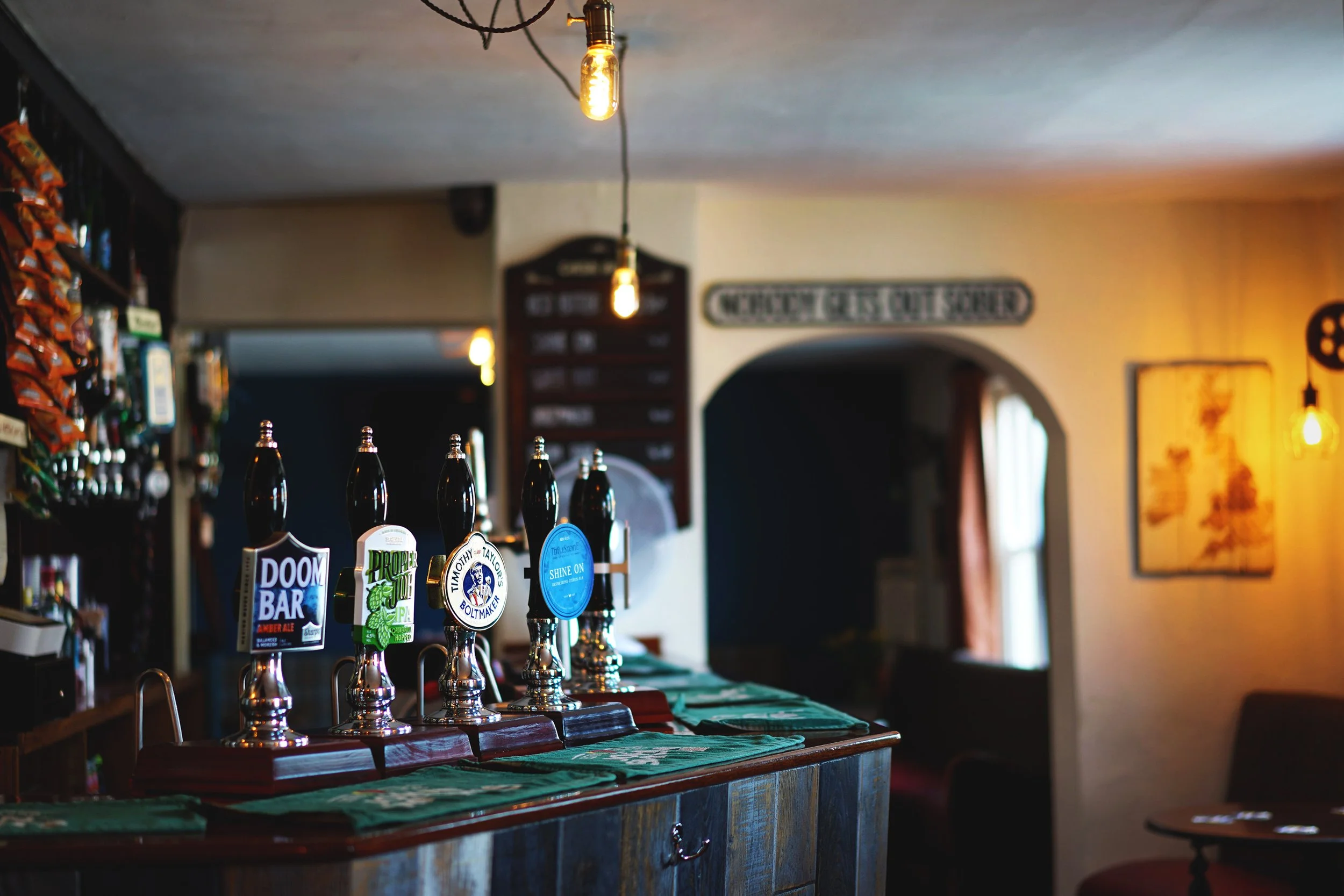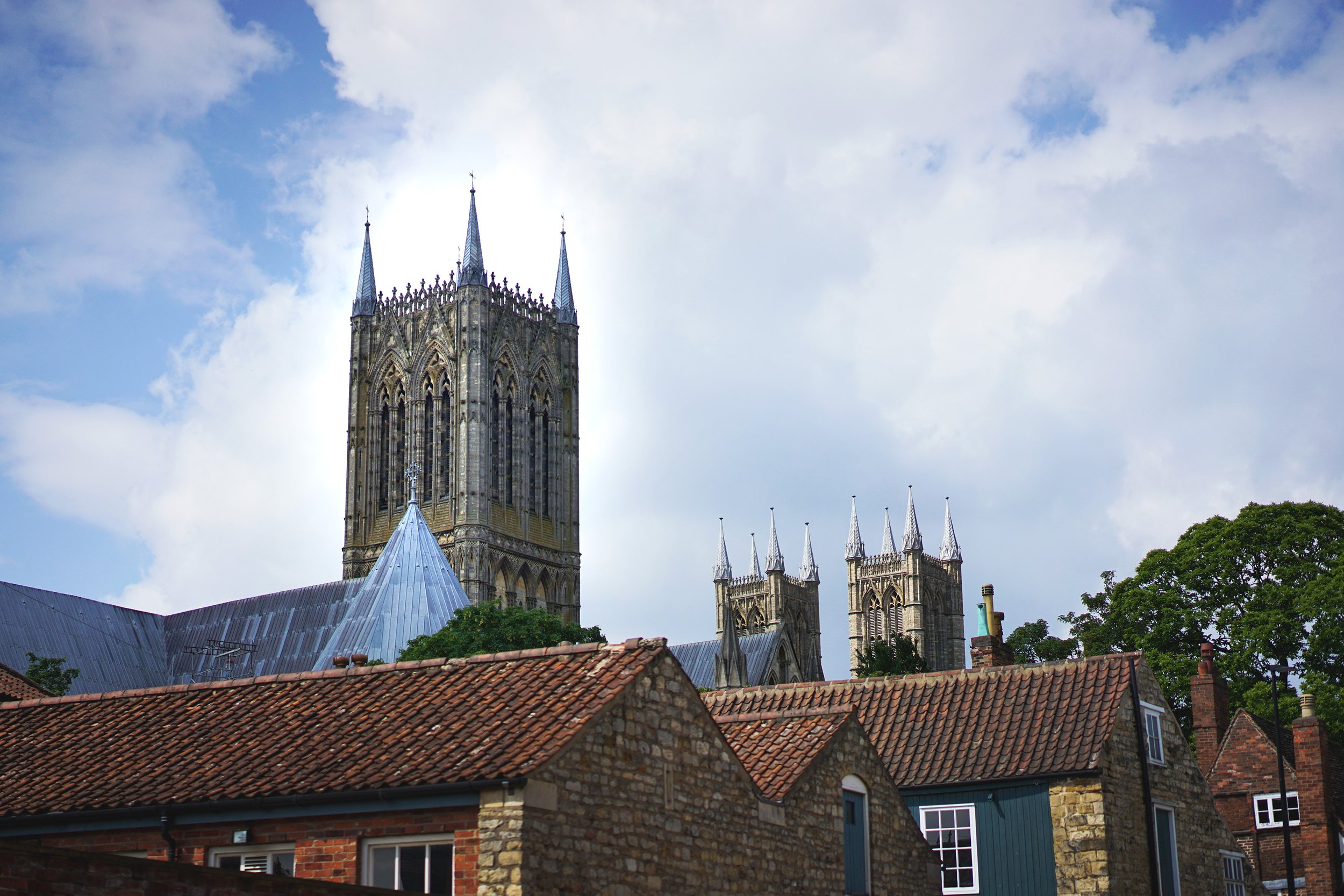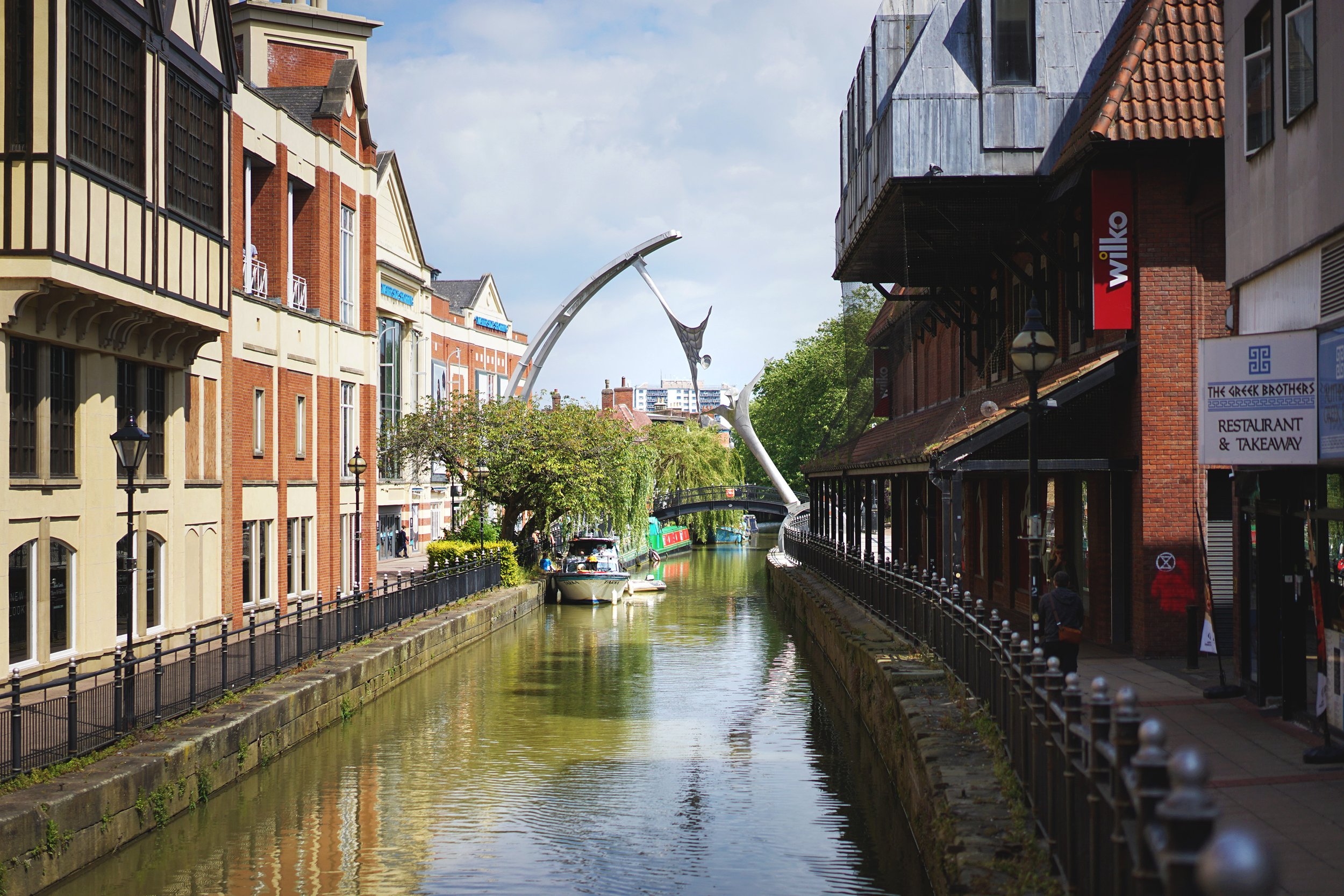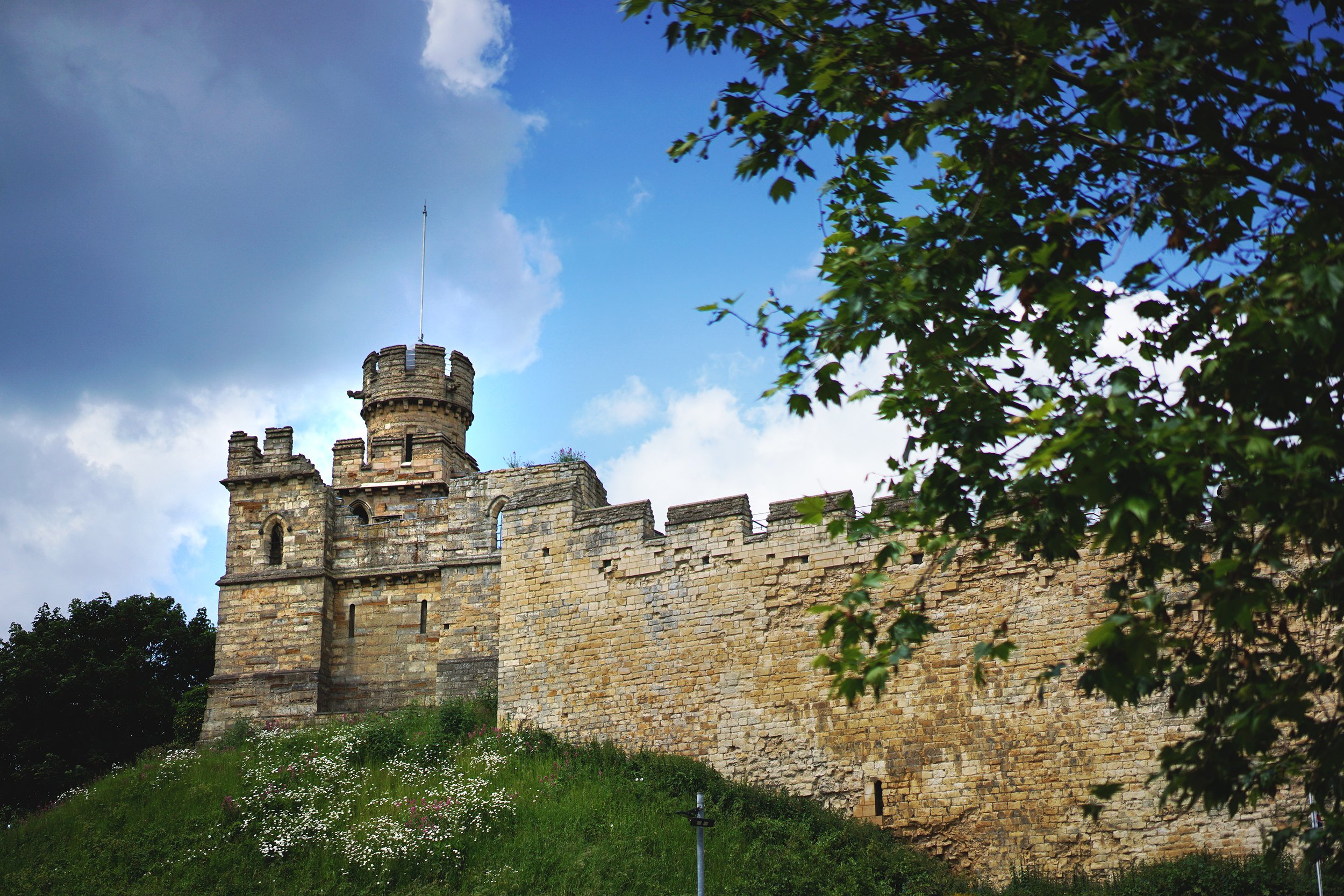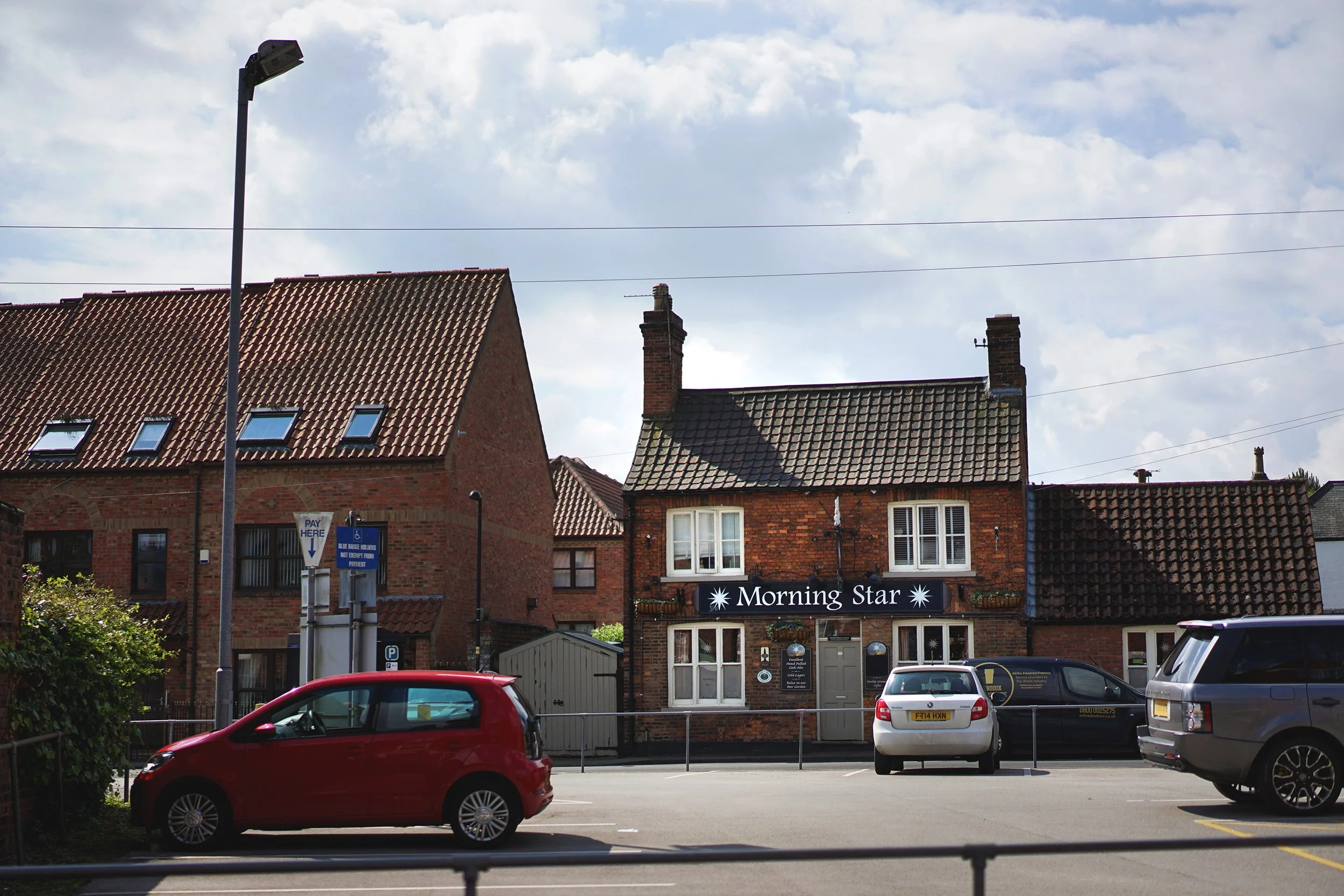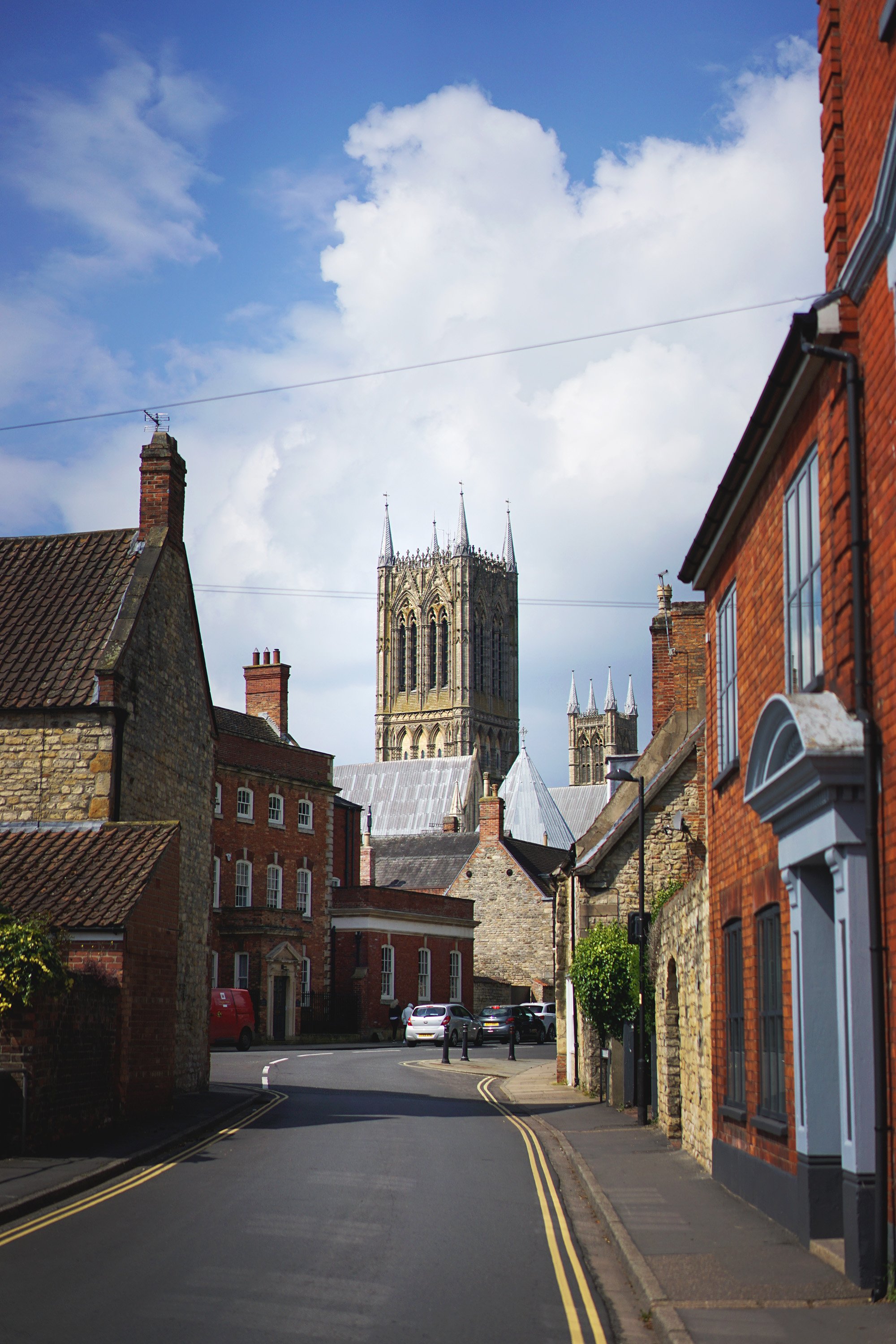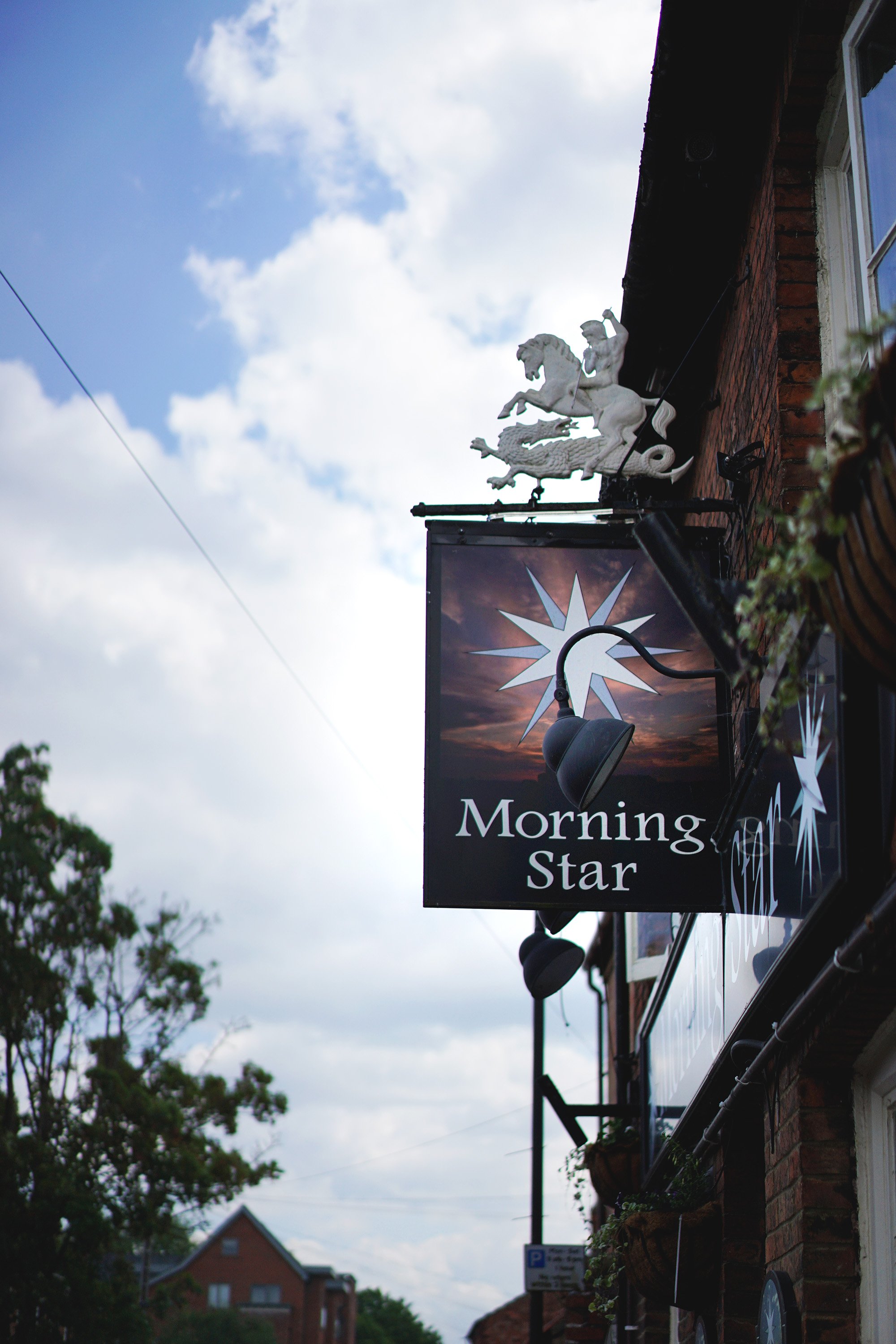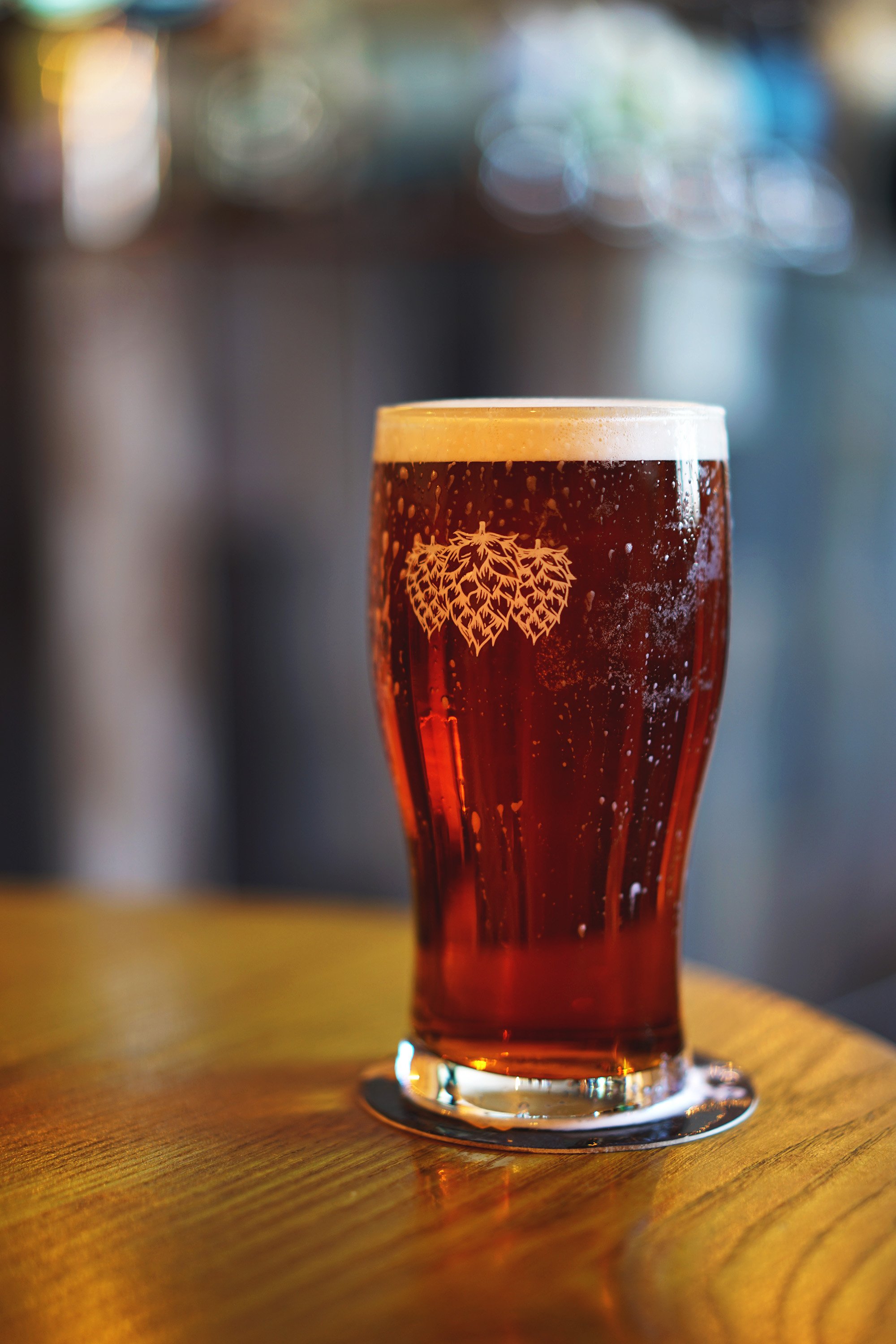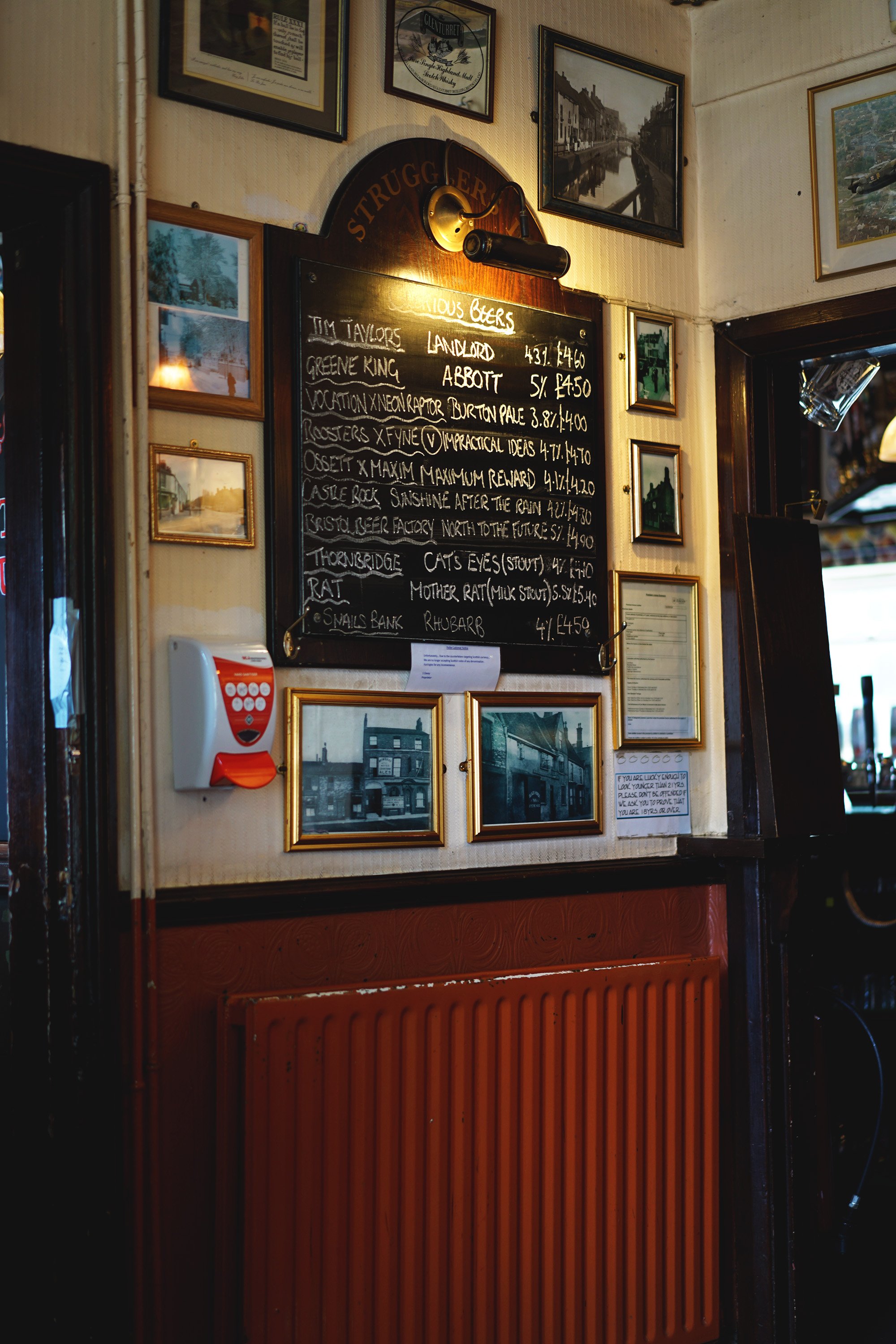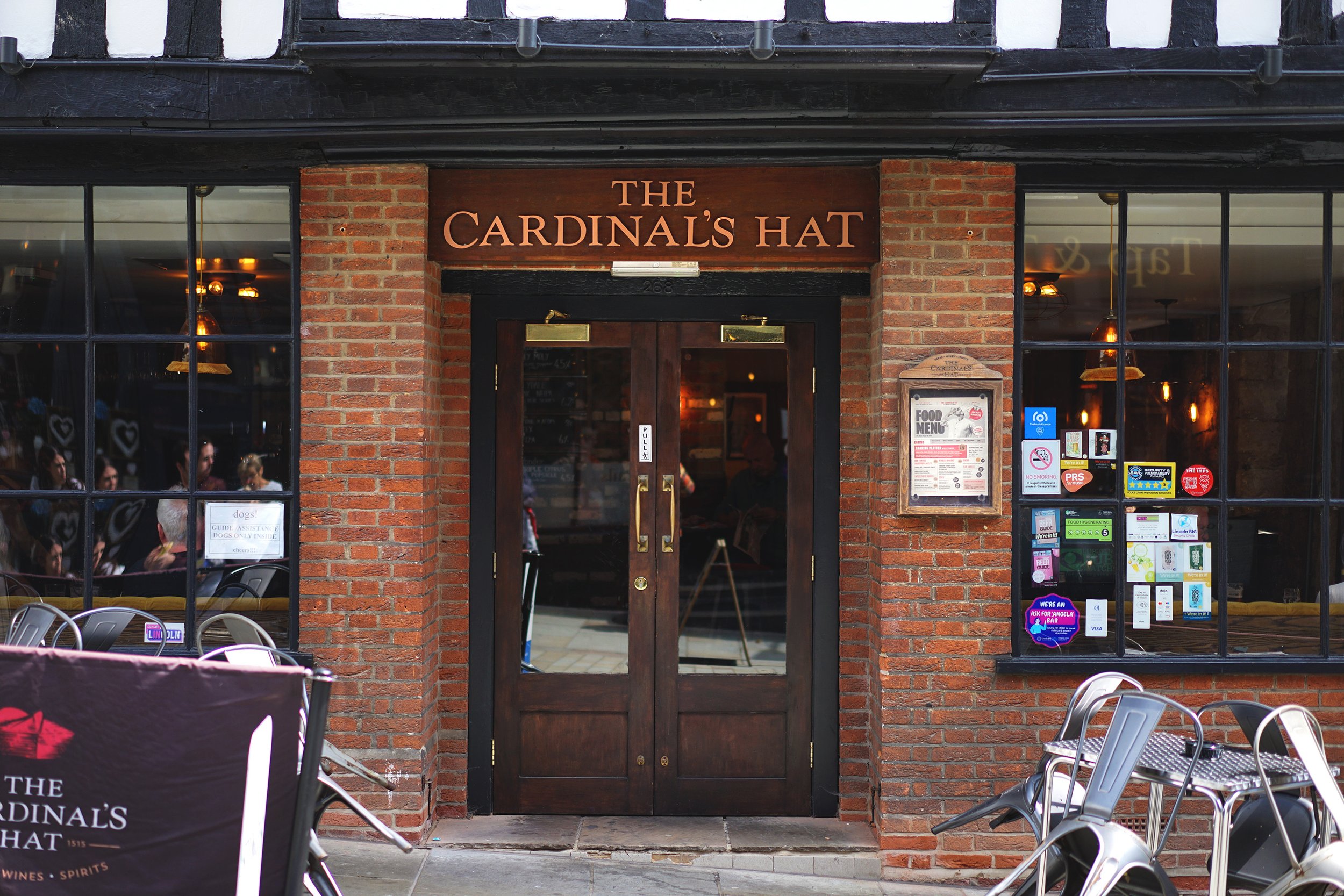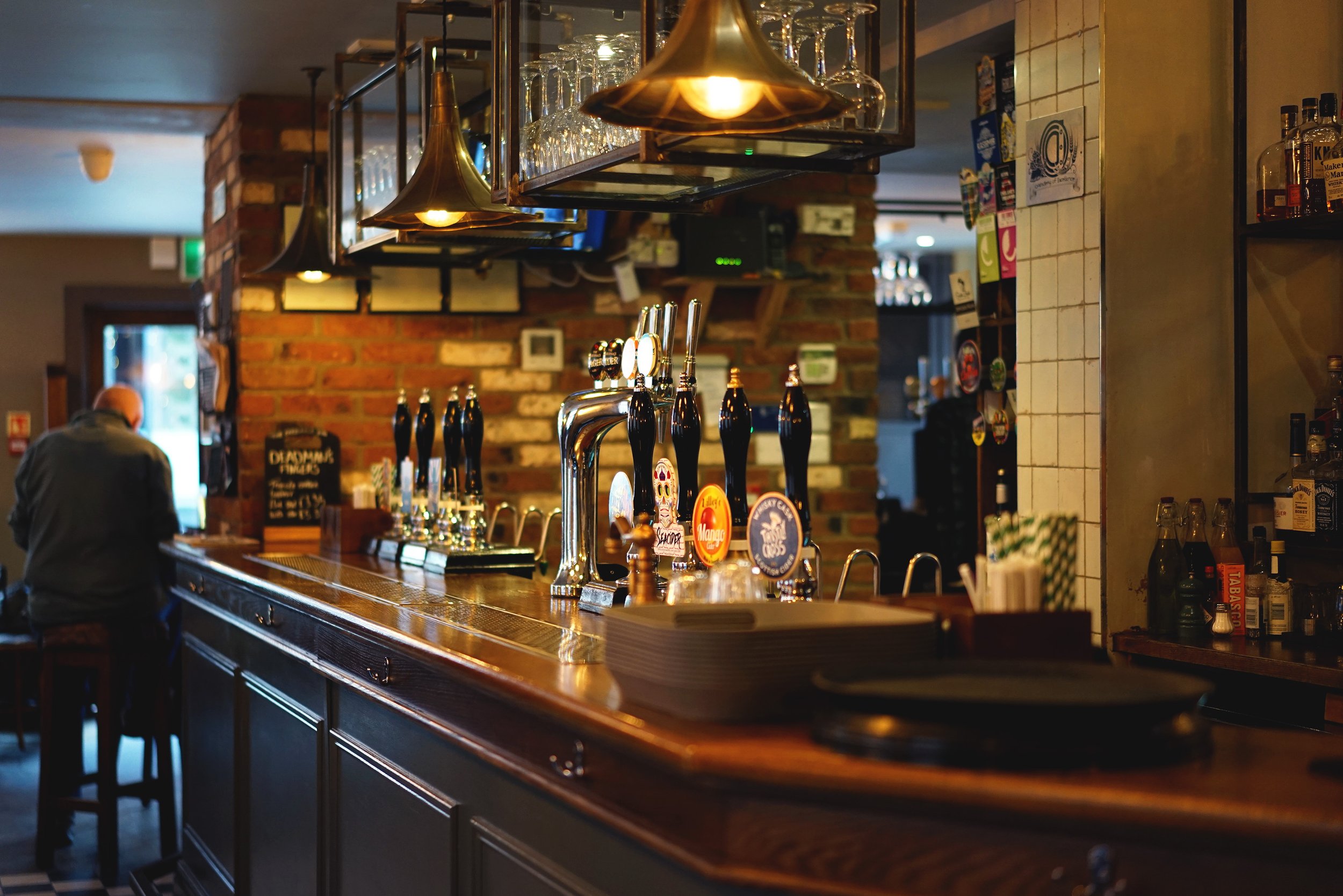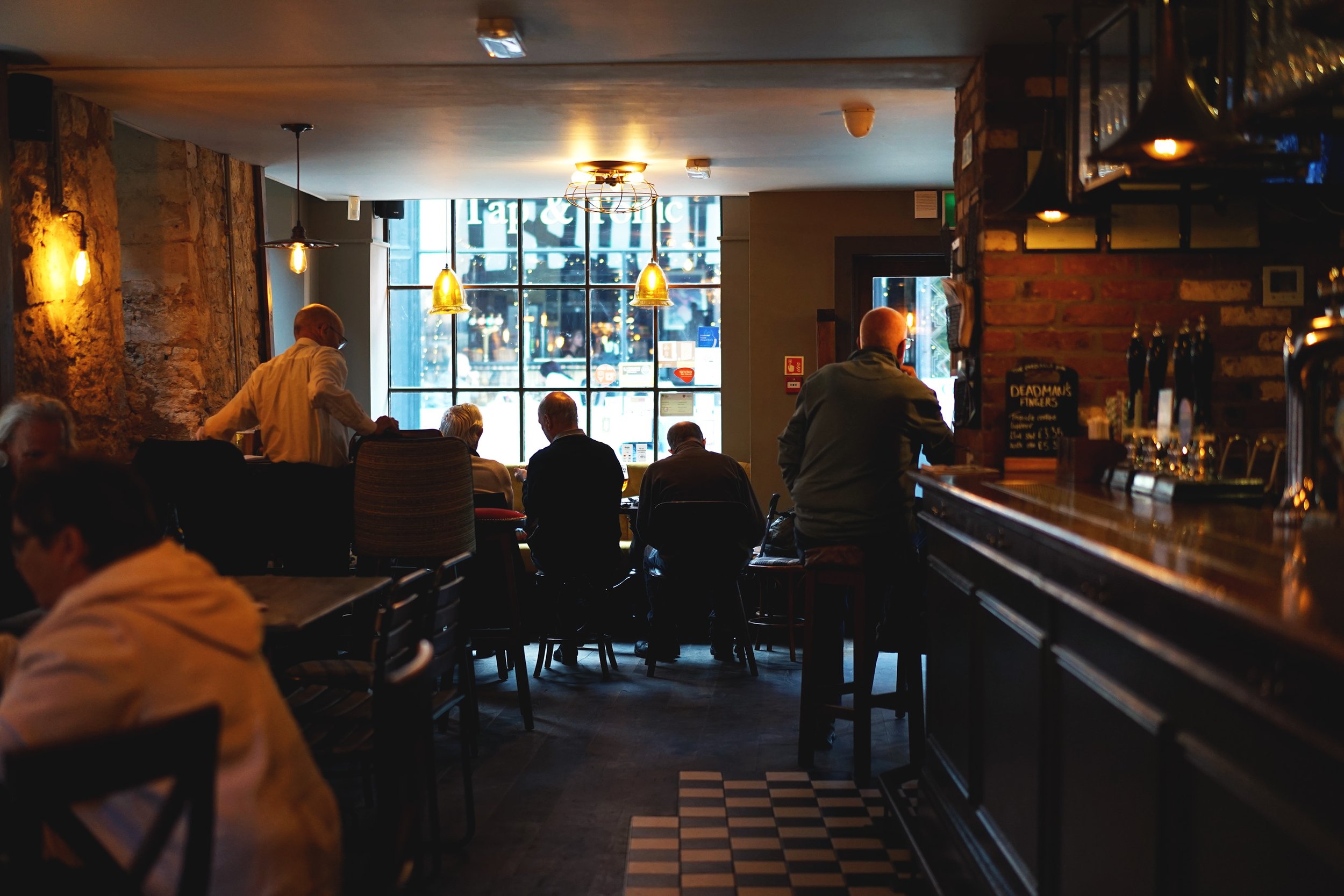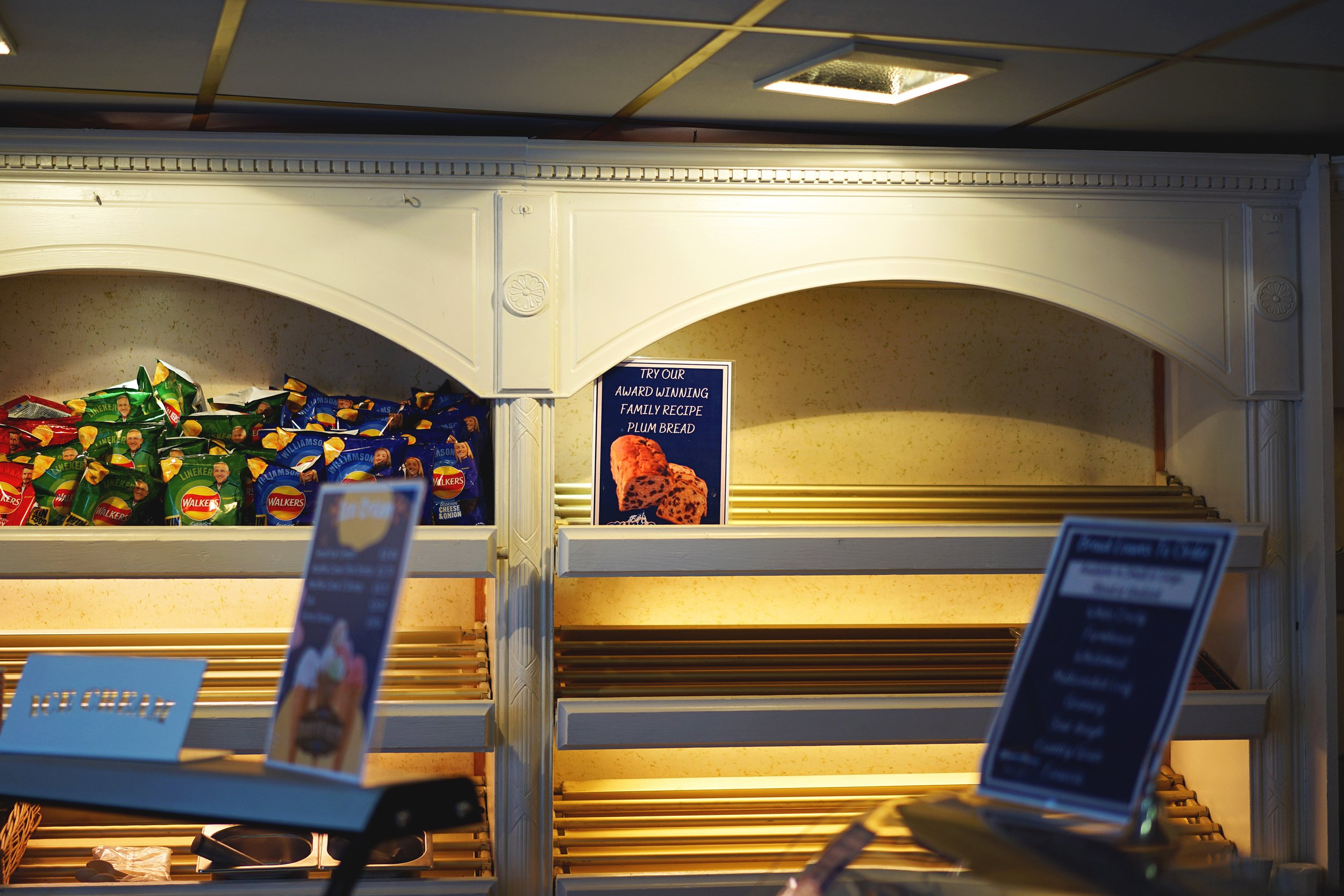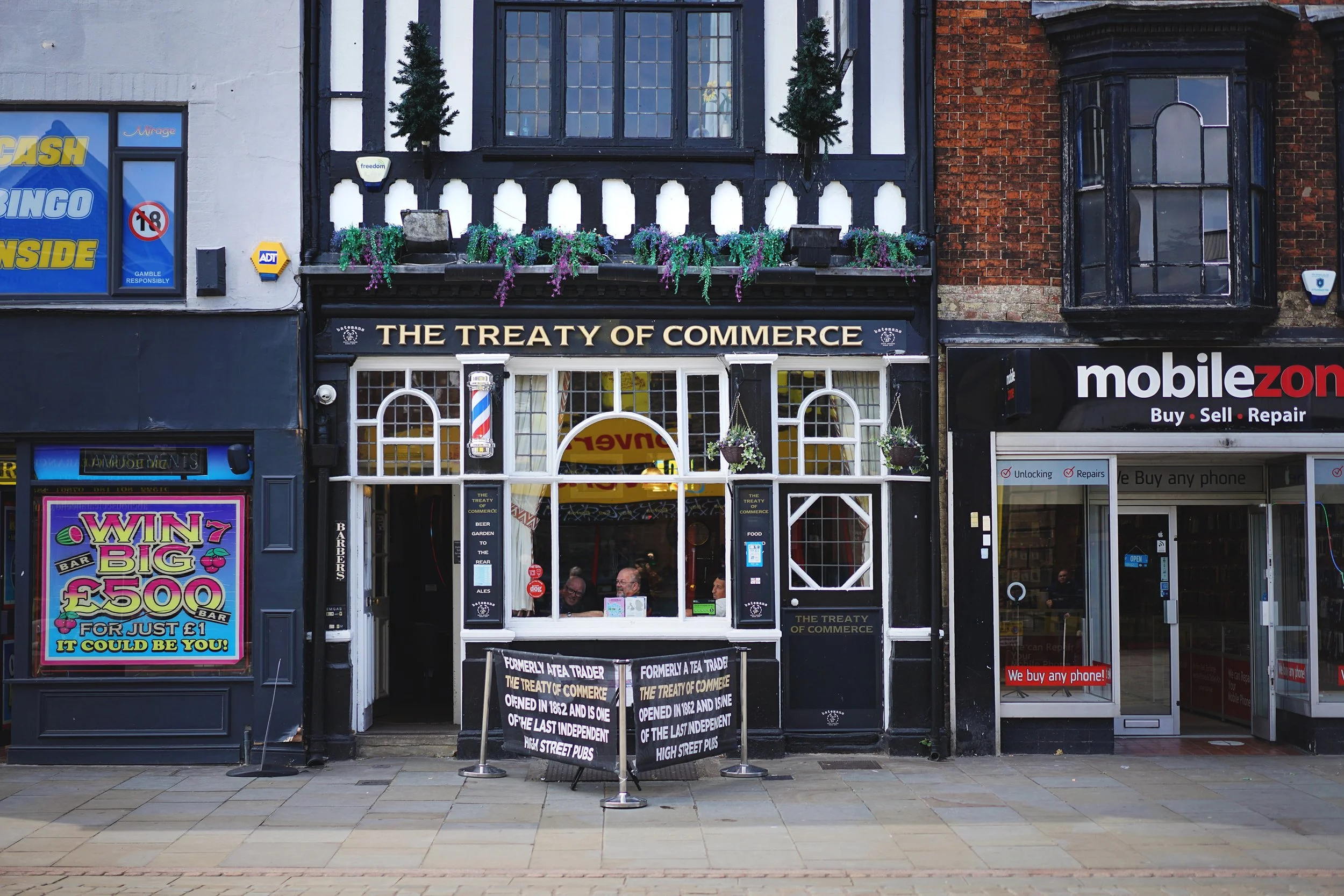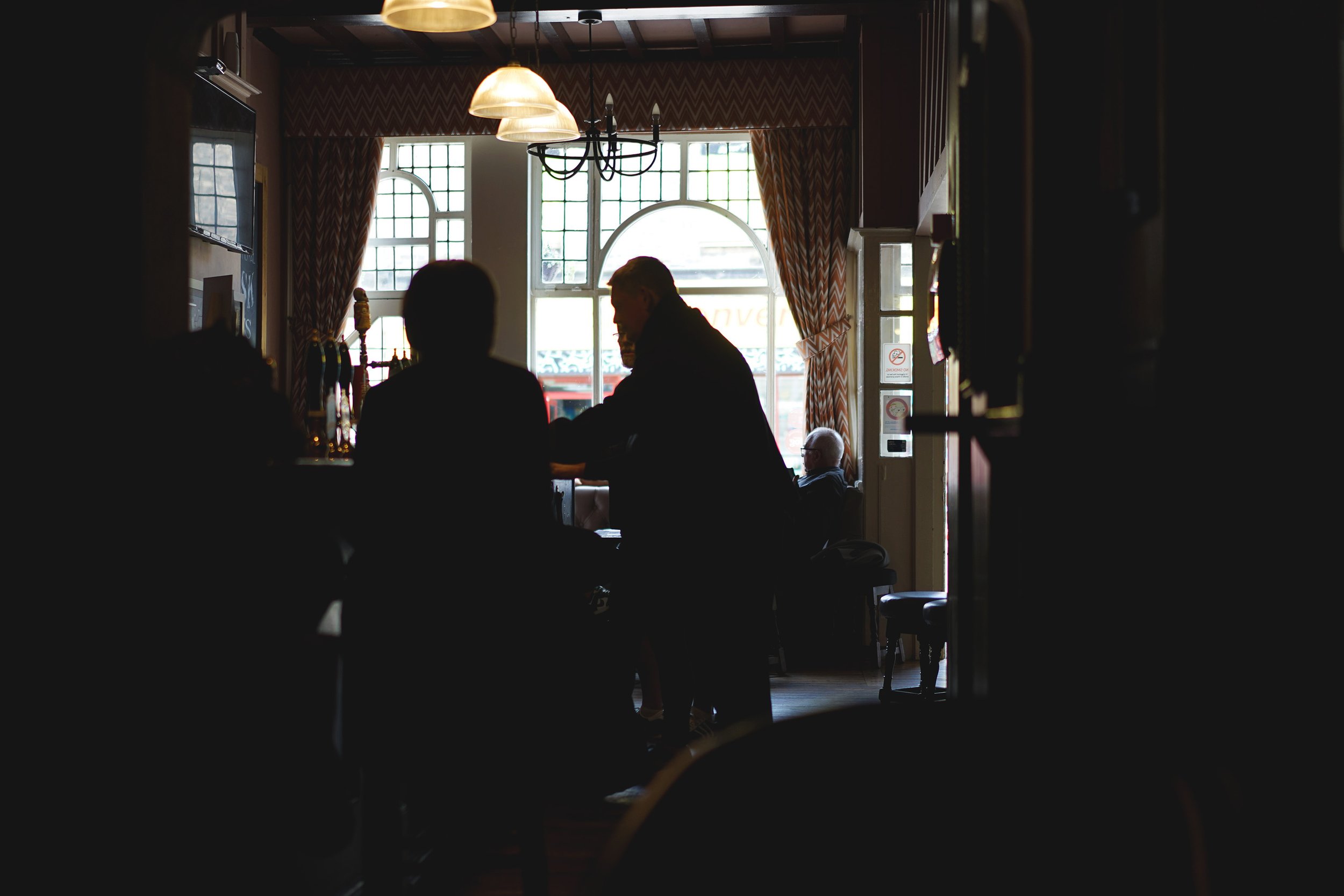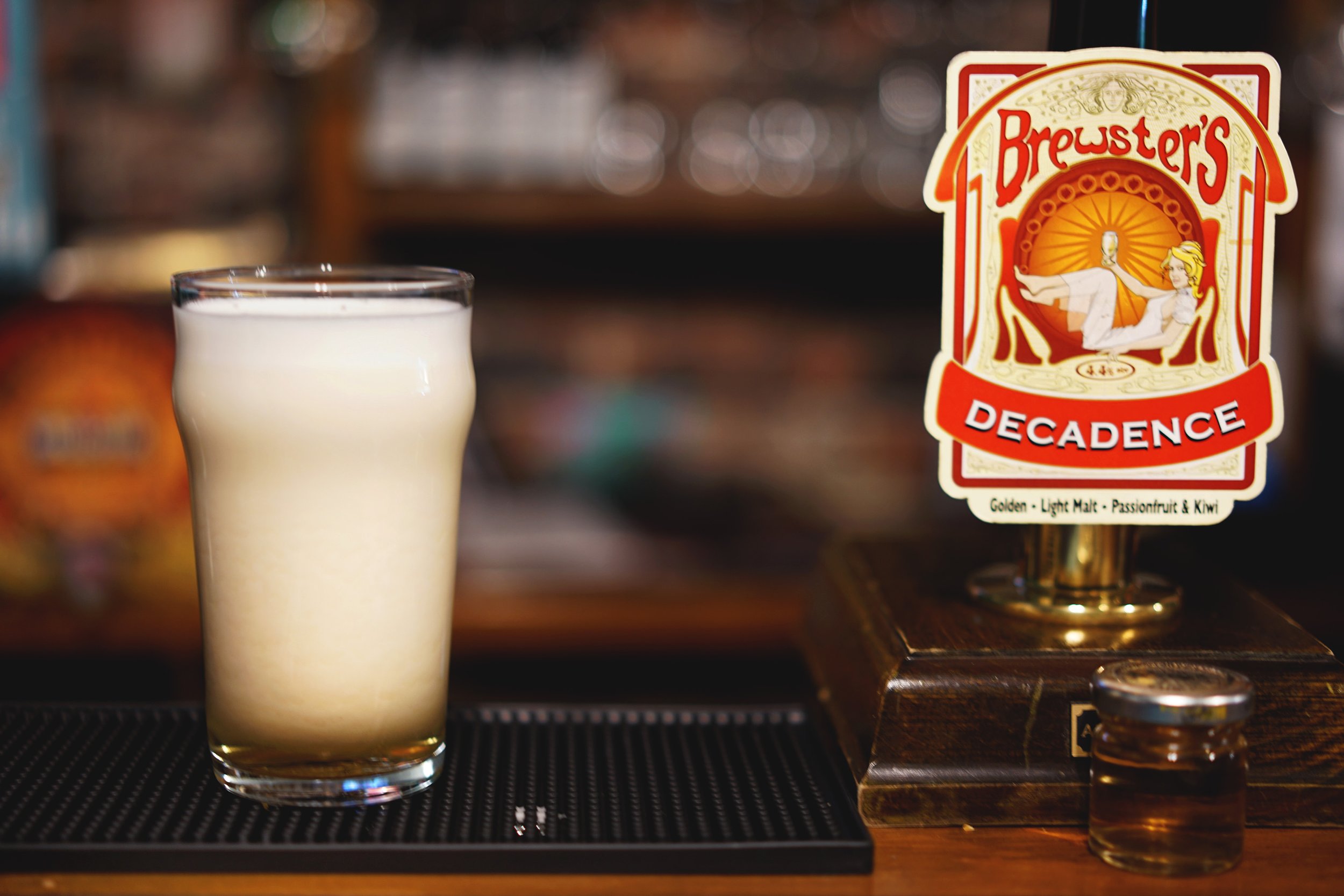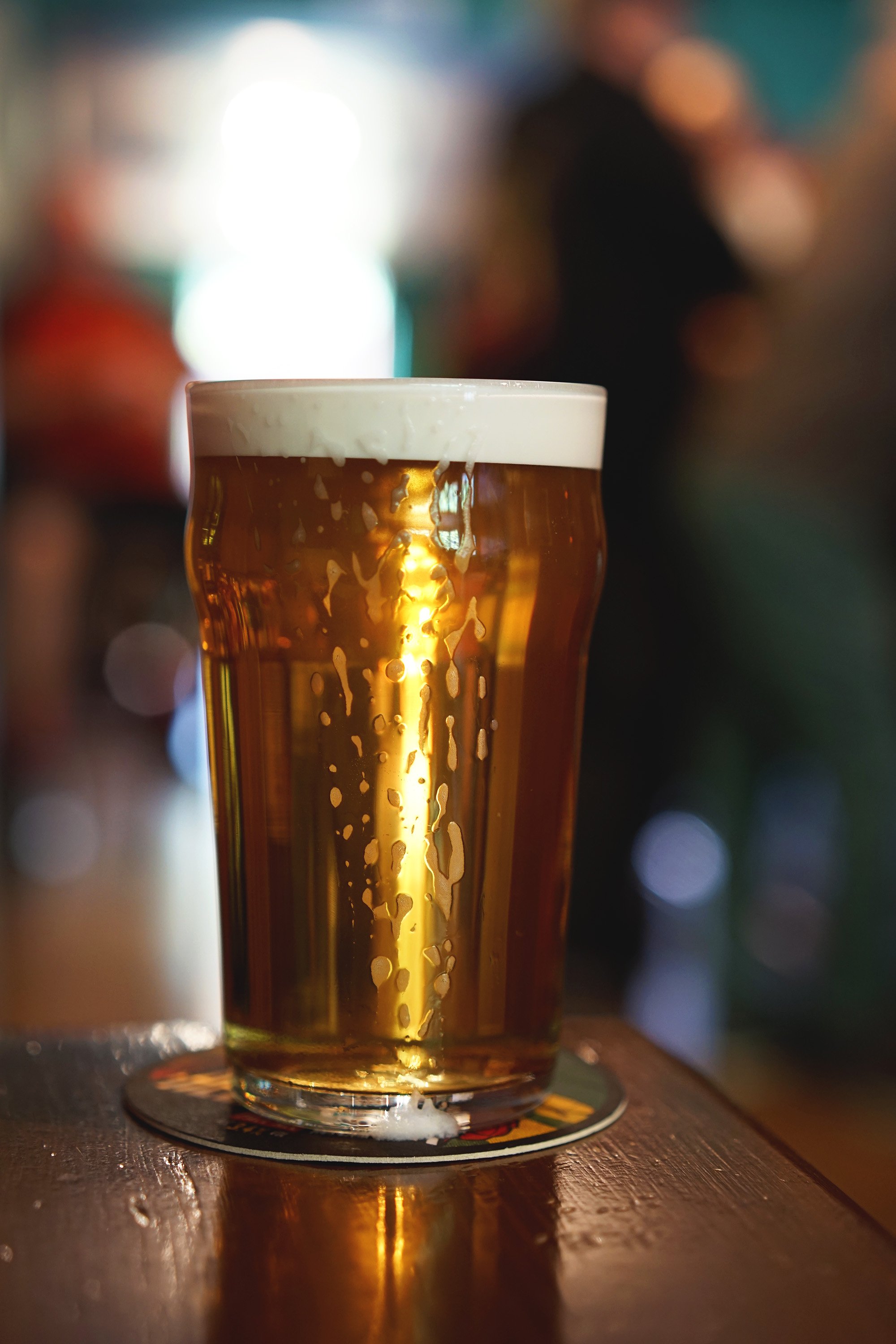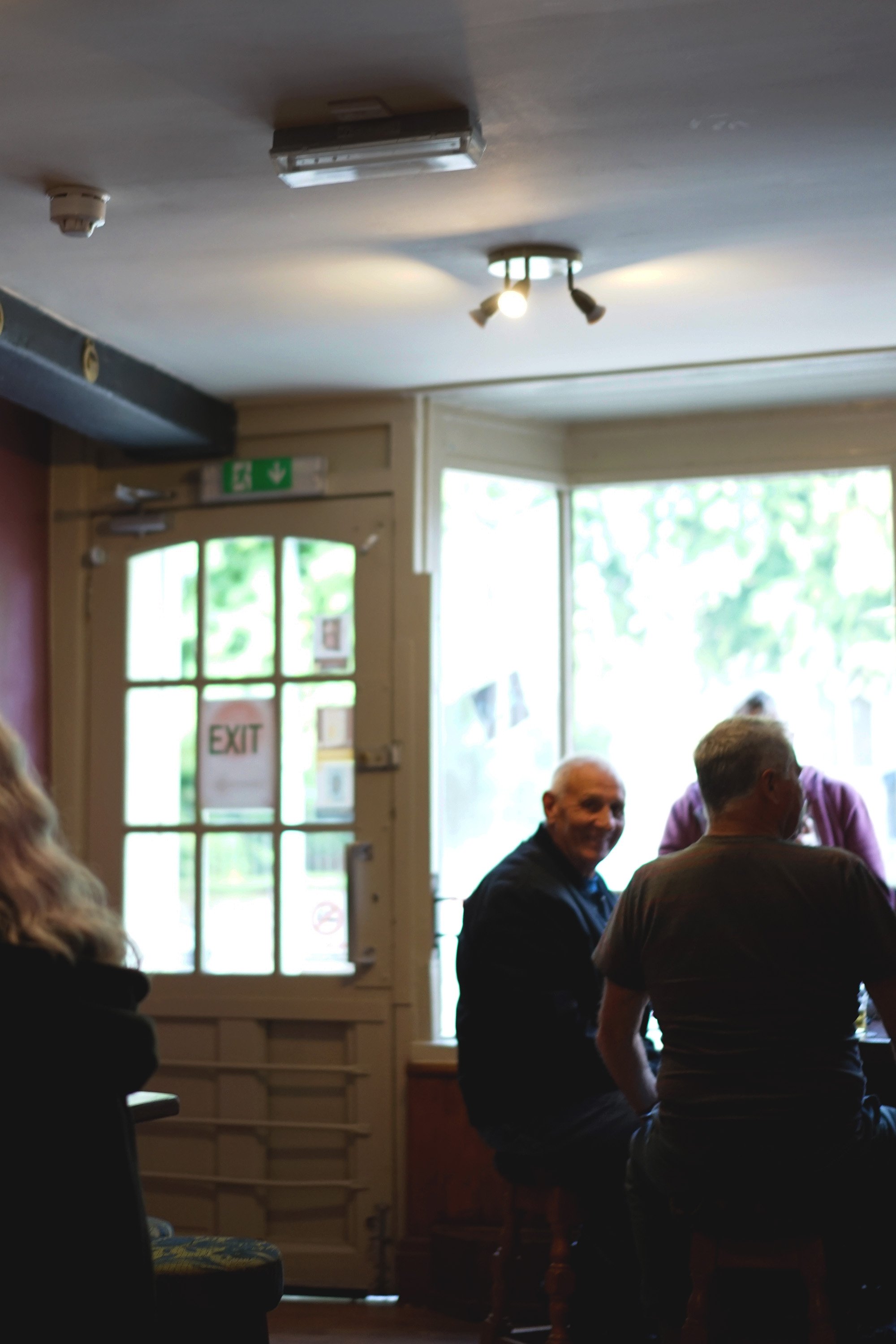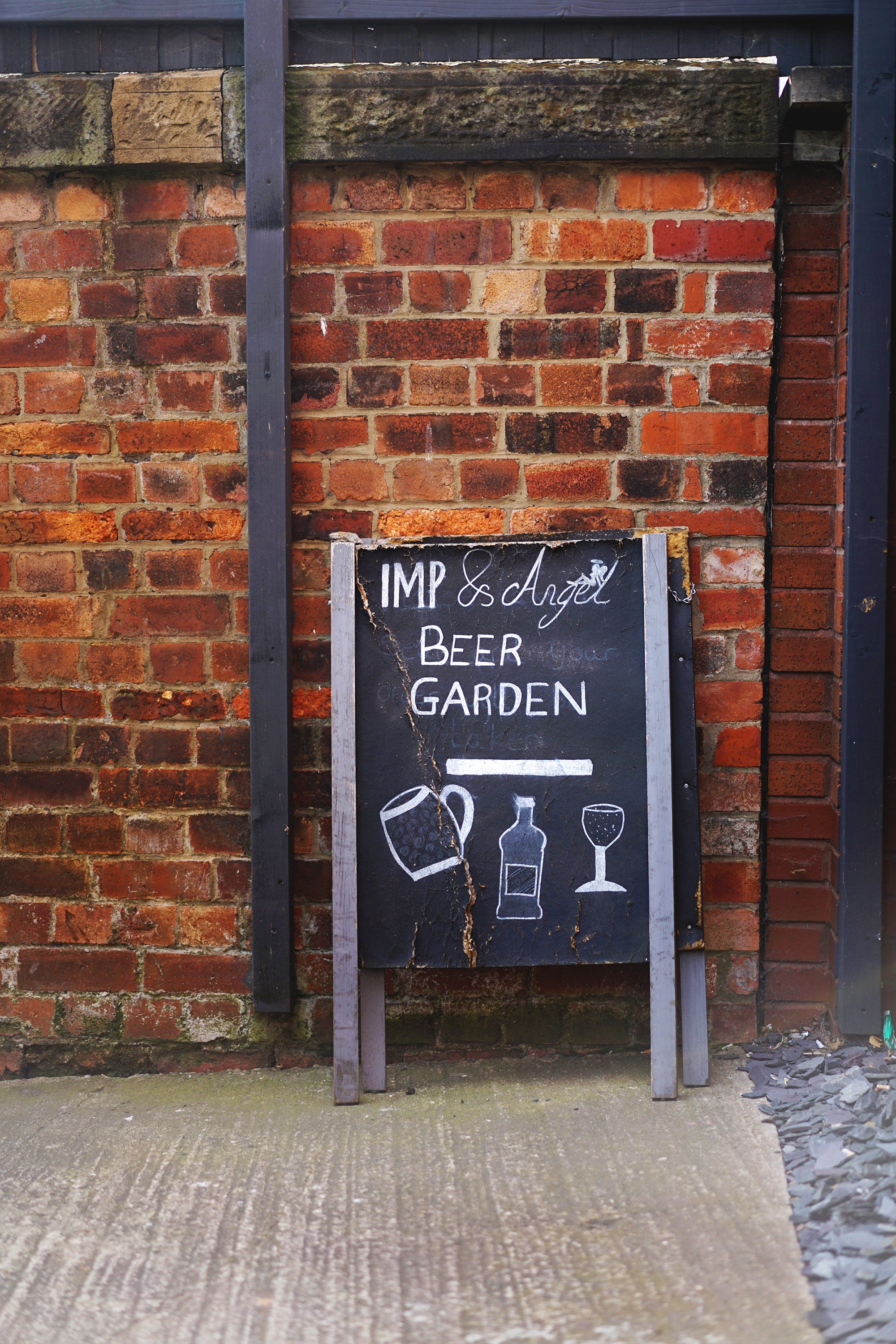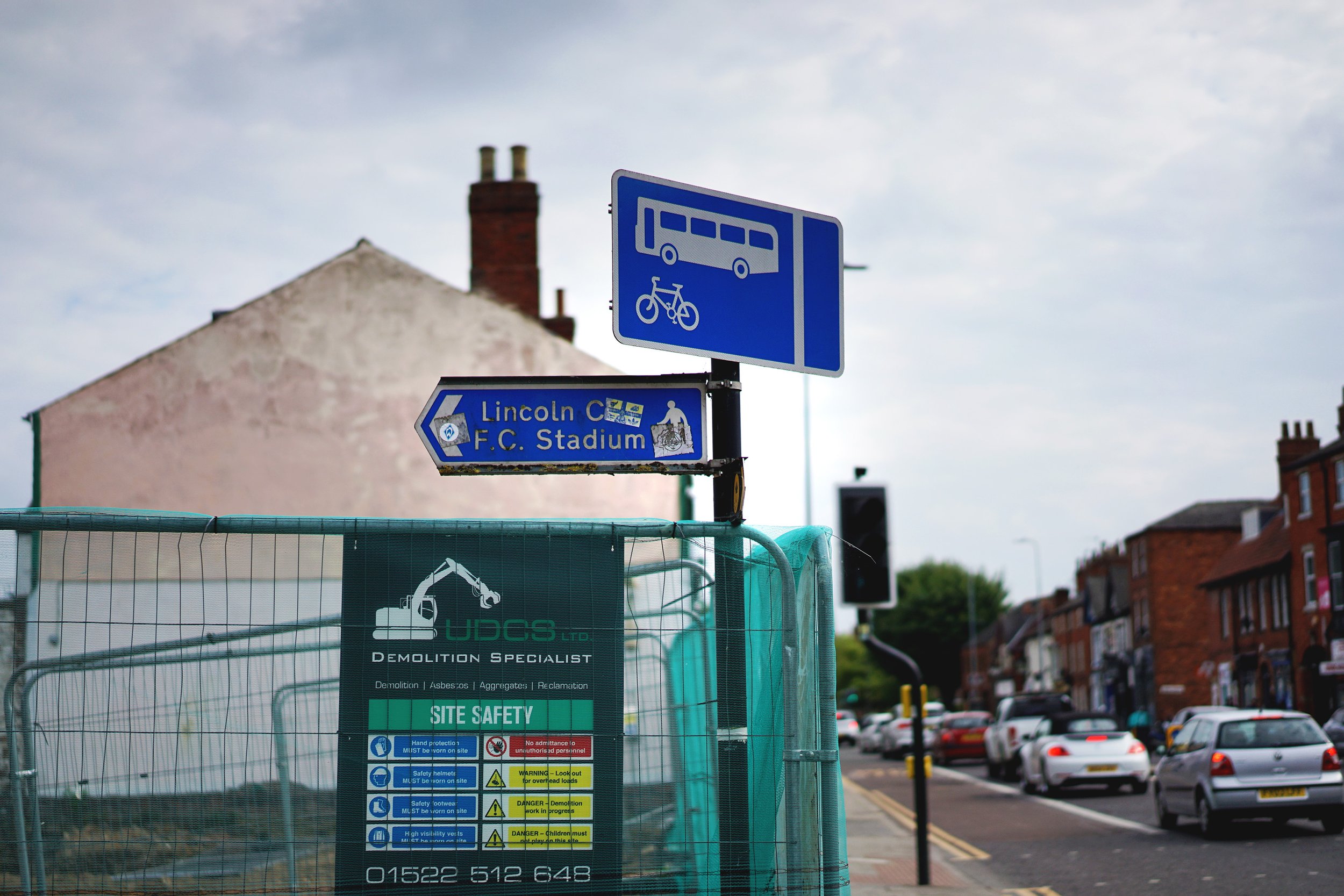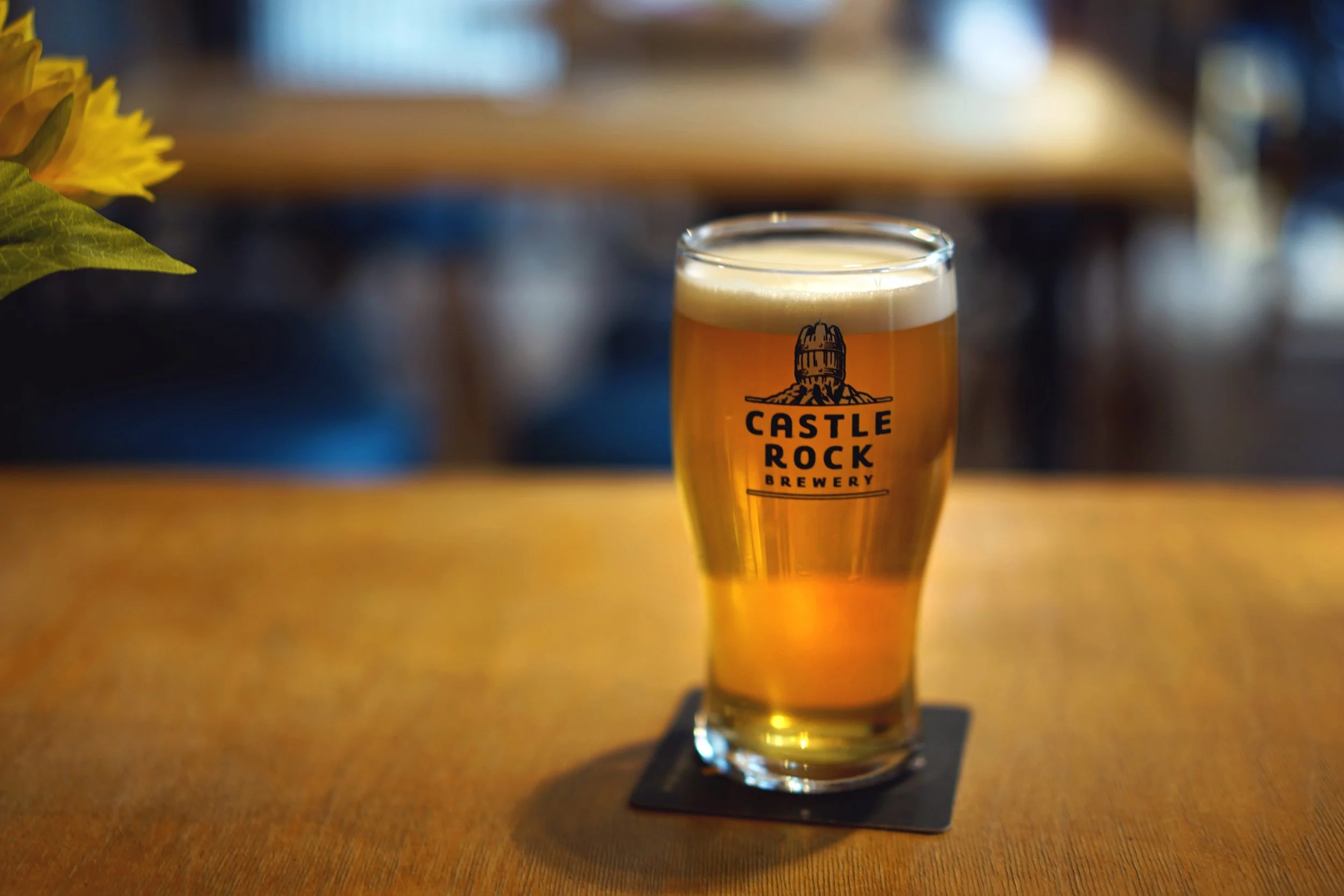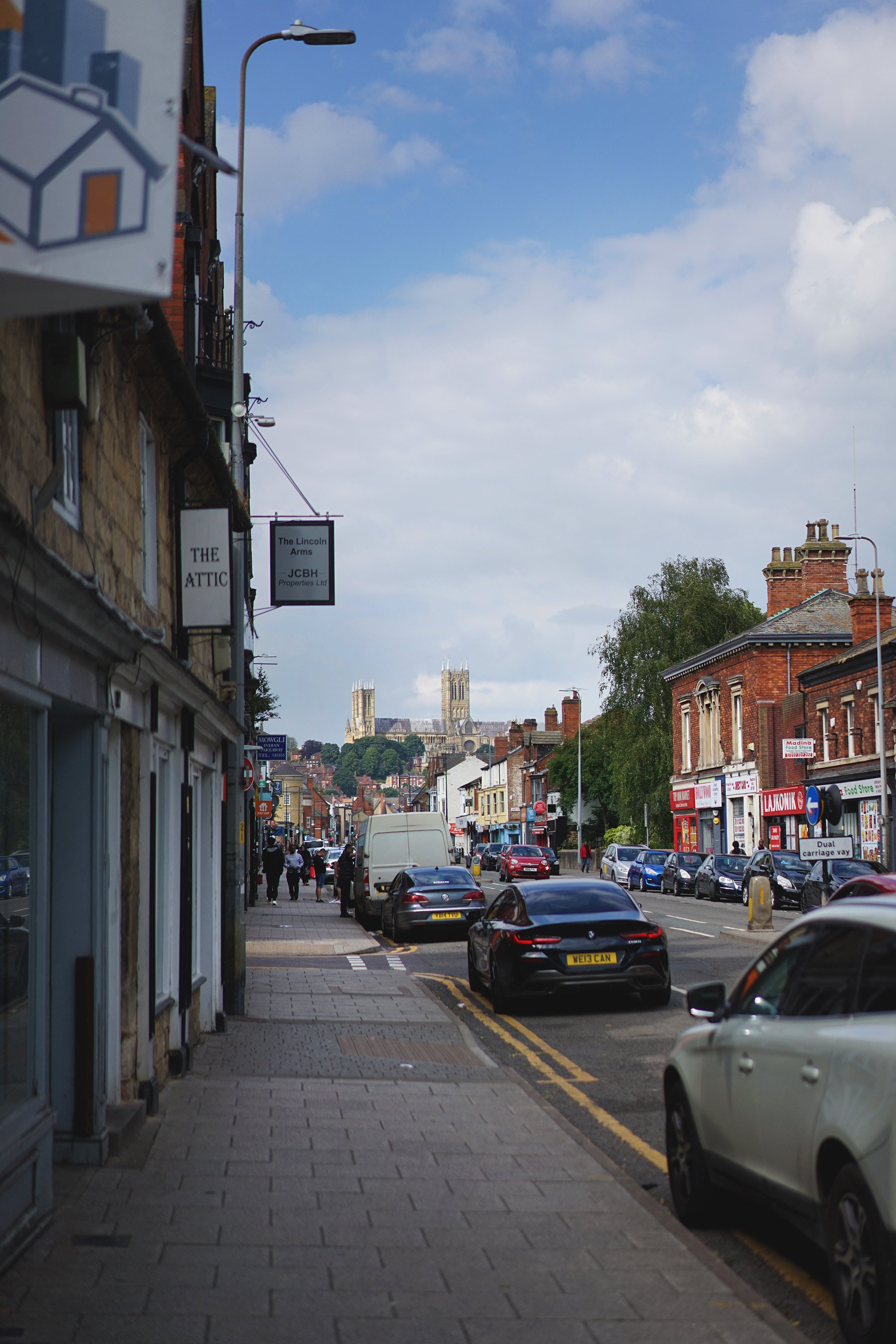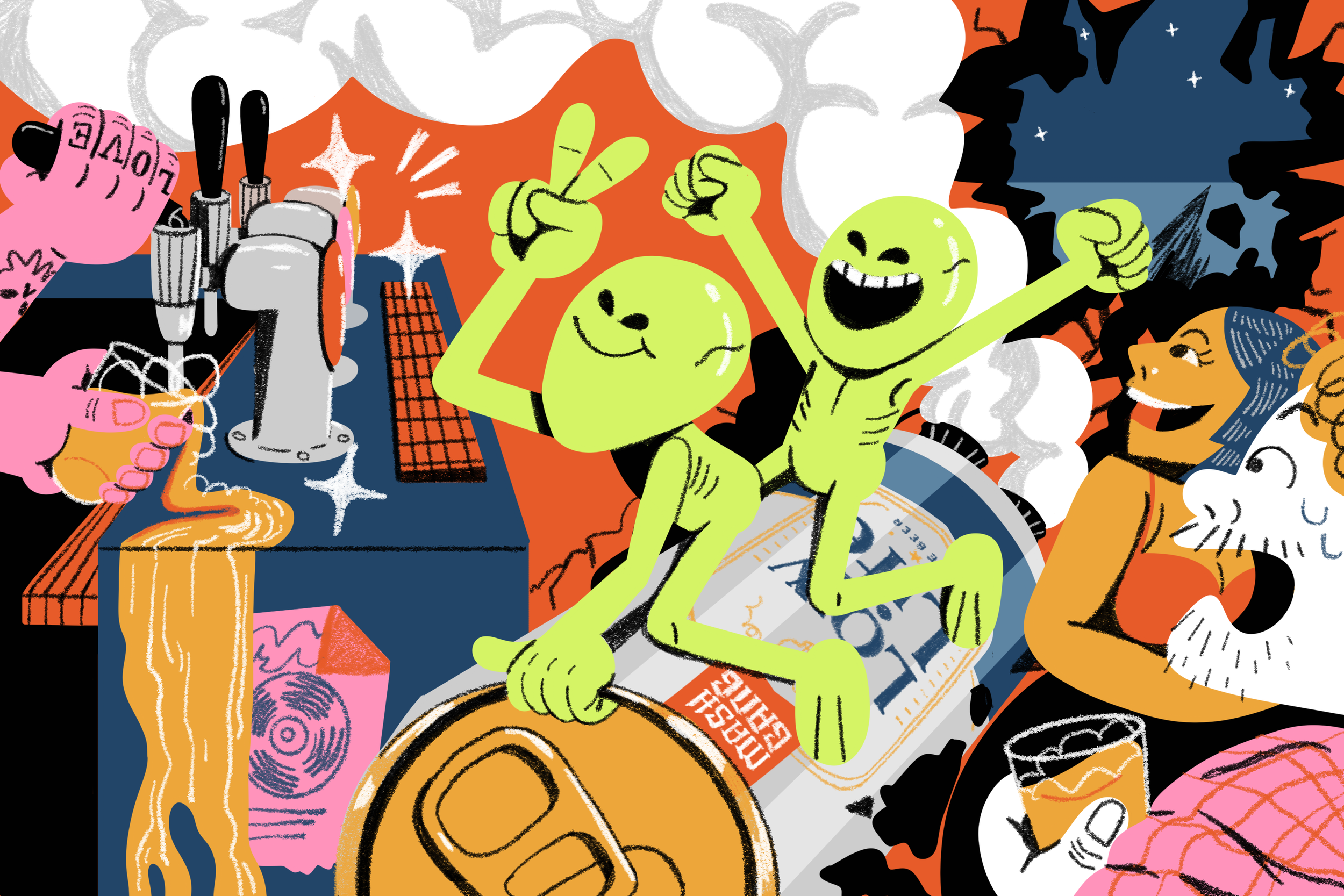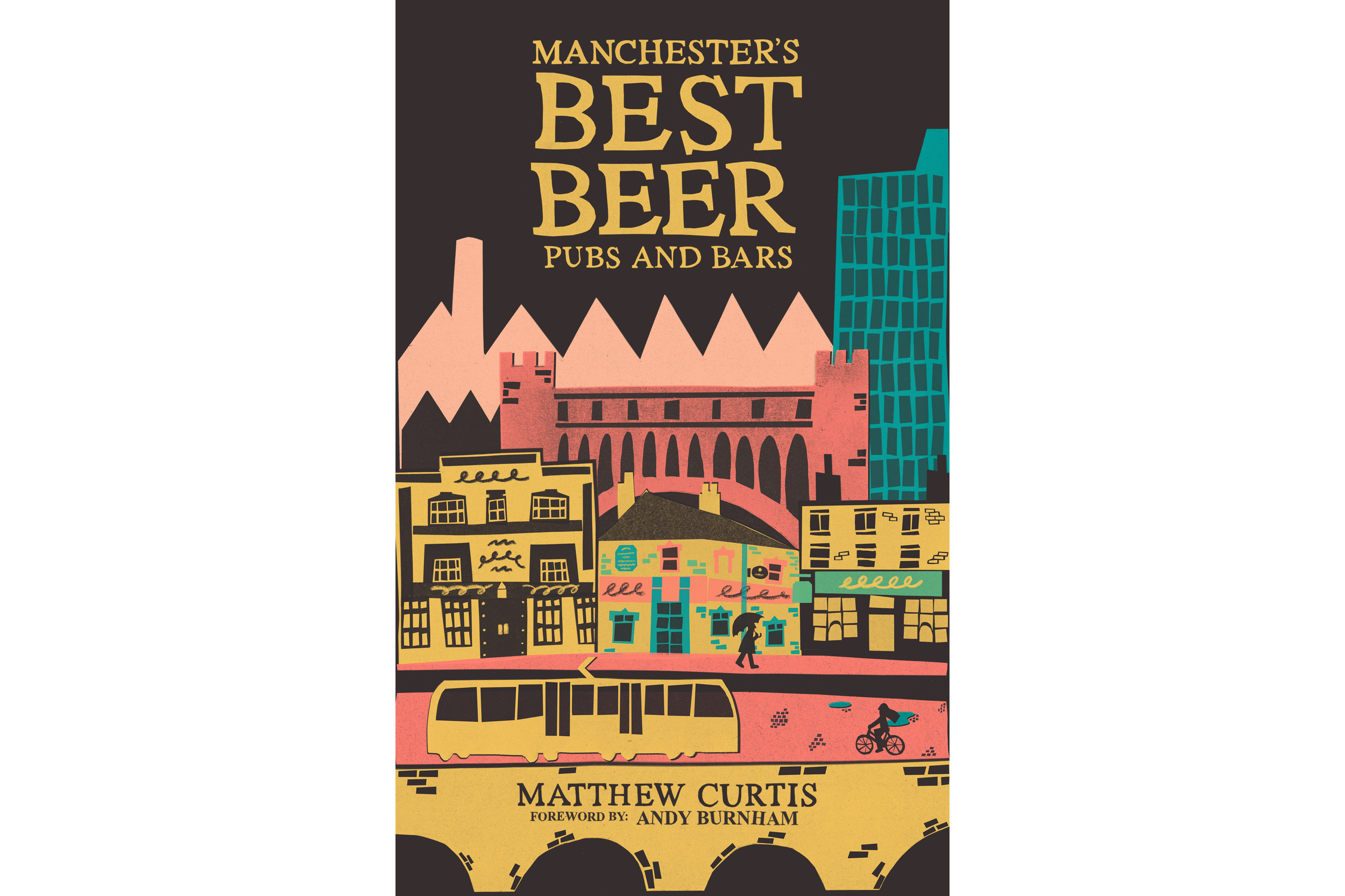Between Angels and Imp Sects — A Search for Identity Within Lincoln’s Pubs
My connection to Lincoln, my birthplace, runs deep. These days I present a proud demeanour of being a born-and-bred Lincolnian, and yet the truth is I’ve always struggled with how this frustrating little city forms such a strong part of my identity.
I left when I was 19, but Lincoln has always travelled with me. When I went to university in Middlesbrough, it meant that I was ‘southern’, which was something I resented. When I moved to London aged 22, it meant that I was ‘northern’, which I relished. I met lots of other ‘northerners’ who had also moved to London seeking a different life for themselves.
Photography by Matthew Curtis
Perhaps, also like me, they anticipated experiencing one greater than they were capable of living in their hometowns. London, however, is quick to adopt. Slowly but surely I too became assimilated, and proudly referred to myself as a Londoner.
But this doesn’t wash up north. Moving to Manchester, I’ve had to re-identify with my Lincolnshire roots. “This is Matt, he’s from London,” a friend might say to introduce me, before quickly correcting themselves after a quick look from me. “Oh, he’s not from London, he just lived there, he’s from Lincoln.”
***
My parents were born in Lincoln. My dad grew up in the same village I spent the first two decades of my life in, my mum on the Ermine estate in the city itself, before moving to Bunkers Hill on the outskirts of town. Mum’s side of the family isn’t originally from Lincoln, but her parents spent most of their lives here. Her mum, Joan, was a switchboard operator, her dad a train driver. Sadly, mum’s dad, my grandpa George, died of a heart attack three months before I was born and I never got to meet him.
My dad’s family can connect their history to Lincoln as far back as they’re able to do so, especially on his fathers side. Frank Curtis senior worked for food giant Batchelors as a pea farmer (although the only work he ever spoke to me about was his time as an RAF flight sergeant during World War Two.) His mum, my grandma, Peggy, was—remarkably—a journalist and poet. She wrote under the pen-name April Calthorpe, had an agony aunt column in the Lincolnshire Echo and had two books published by Foyles, including Christmas Gifts and Decorations in 1955.
I know little of my family history beyond my grandparents’, but recently I came into possession of an antique mirror that once belonged to my Dad, and formerly hung in our family home. Not long after I’d collected it from a lockup last summer, he revealed it once belonged to his grandfather, who was a tailor, and owned a shop on Lincoln High Street. I had lived in the direct vicinity of this precious object for half my life, without ever realising its significance.
I’ve always known my grandad's family lived in Lincoln itself, in a house on Water Lane a few metres behind where the River Witham flows directly beneath the High Street, right before it meets the Brayford Pool. You can’t see the house, sadly, as it was pulled down to make way for a car park long before I was born.
Like I said, my ties to this city run deep, but as a teenager I hated it, and often the mere act of visiting the city when heading back to see my mum all these years later has made me feel uncomfortable. For most of my life, I have considered Lincoln to be a cursed place.
My childhood was fine, pretty standard you might say. My parents didn’t seem to worry about money even if they were, and we were always able to visit the north coast of France or the south coast of England for a couple of weeks during the summer holidays. But beneath that veneer, for as far back as I can remember, my parents' marriage was not a happy one. It is this that has shaped my relationship with my hometown most of all.
““For most of my life, I have considered Lincoln to be a cursed place.””
You didn’t need to be a marriage counsellor to understand that after two decades together, here were two people who had drifted apart in all senses but for their two children. I spent years hoping, wishing for them to end their relationship when eventually, when I was 14 years old, they finally did, explosively. It would take me years to reconcile the trauma inflicted by these events, and I am proud today that I can say that I love each and every one of my immediate family members very much. But for parts of my life that has not always been the case. I am still working through it, and it is for this reason I am desperate to reconcile my connection to Lincoln, because it is effectively my very own ground zero, where everything started to go wrong.
The funny part is that, as a teenager—one part incredibly awkward and insular, another desperate to be liked and accepted by his peers—I had the audacity to consider that my parent’s divorce hadn’t really affected me at all. Now in my early 40s, I know that it royally fucked me up. I did not see or speak to my mum for almost three years after it happened. When I did eventually leave for university, I found a room during the summer so I could avoid returning home as much as possible. But worst of all, having now invested some time thinking about how this trauma affected me, I can see how as that teenager I simply stopped caring about pretty much everything, while an unhealthy level of resentment for the place of my birth continued to fester, subconsciously.
Almost all of my spare time was spent playing video games like Terranigma or Secret of Mana, sometimes for eight or nine hours at a time. I rarely, if ever, did any homework because I was interested very little, other than the worlds I could escape to through my console. I was being bullied quite severely at school. No one ever offered to talk to me about what I was experiencing at home. So I switched off, shut down, became even more insular, and very, very weird.
I do remember a feeling—or perhaps more of a yearning—of wanting to grow up as quickly as possible. I wanted to hang out with the few close friends I did have late into the night, to walk into a branch of Threshers and pick up a slab of lager and a cheap bottle of wine without a care in the world and get as drunk as I possibly could. But mostly, I wanted to spend time in pubs, and drink pints. I was desperate to be accepted as an adult, and it was within pubs, I thought, where I could finally be considered one.
Before I left, I would spend plenty of nights out combing the bars that dotted Lincoln High Street and the Brayford Wharf, some of which I would definitely prefer to forget. But one thing that stands out among them was how, as 18 year olds, we played it safe. Lincoln University was in its infancy then, so it wasn’t a very studenty city. Still, there were bars like The Varsity and The Quayside where young drinkers weren’t just tolerated, but encouraged in by cheap drinks offers and bar staff who, in a pre-Challenge 25 world, would happily turn a blind eye to underage drinkers who just about looked old enough to legally enter the building.
Pubs, however, and by this I mean proper pubs, were off limits to young drinkers. At least that’s how it felt to me at the time. As a counter to this, the people I drank with would tell me these places weren’t cool, and only losers drank in them. They also, apparently, sold only ale, which was terrible, or so I was led to believe. Up until my late 20’s I found pubs like these to be incredibly intimidating. Perhaps this is why I now consider pubs to be sacred; once forbidden spaces that are now my favourite places to be—I am rarely happier than during the time I get to spend inside them.
***
Since moving to Manchester and experiencing conversations that forced me to re-centre Lincoln as my hometown—and as part of finally reconciling the traumatic effect the end of my parents’ relationship had on me—I have found, to my surprise, a need and a desire to reconnect with my Lincolnshire heritage. After plenty of introspection I decided that this year would be the one where I made some genuinely meaningful effort to do this. The best approach, I considered, would be to head into the city for a few hours and spend some time in spaces I already feel a significant connection to. It made perfect sense. I would do this through its pubs.
I made plans to visit my mum, leaving enough time to spend a full day within Lincoln itself. The goal was simple: to visit a few pubs, while contemplating my misspent youth, and why, despite it all, I feel so strongly about this city as part of my identity.
There were to be ground rules, of course: first I decided I could only visit pubs which I had never set foot in before. If I once found some of these places intimidating, then I considered that exercising the confidence I now have as a regular pub goer would help me define the raw framework that would help me put my feelings together. Next I plotted a route that would take me from Lincoln’s Cathedral Quarter straight down the High Street towards Sincil Bank and the South Common. It would allow me to take in seven pubs and therefore as much of the city as possible in one day.
““If you’re ever going to uncover a city’s true sense of place then the best way to do that is through its food and drink.””
I also decided that in each pub I would be only allowed to order one pint, which must be cask beer. This was, in part, to prevent me from dawdling, but I was also curious how well presented the beer in my hometown would be.
I did not know if I would find what I was looking for when I got there, but the prospect of visiting some good pubs had instilled in me a sense of excitement that I hadn’t felt when visiting my hometown for a very long time. Within them, I hoped to find a part of myself that for some reason, I stopped caring about a long time ago.
***
10:39 — Tennyson’s Statue
The day starts off well. Mum has a hairdresser’s appointment on the other side of town and has offered me a lift. This means I have to leave early, burdening me with an extra hour to kill before the pubs open. No matter, I thought, this would give me a rare opportunity to play tourist in my birthplace.
Mum, however, is running late, so puts her foot down. She banks hard down a side street, hitting 40 in a 20 zone. I grip my seat, before reassuring myself that she has spent her entire life driving on these roads, and probably knows them better than anyone. She drops me off close to my first stop and reminds me I need to be home before 7pm. It’s her choir practice this evening and she wants to make sure I’m back in time for tea.
It’s a pleasant, late spring day. A Thursday. Although a little cloudy, there’s plenty of blue in the sky, meaning that bright sunshine illuminates the intricate facade of Lincoln Cathedral looming in the near distance. Making my way towards it, I pass what will be my first stop, The Morning Star, and pause to take a photo before double checking that it’ll be open soon. As it happens it opens at 11am, but I decide I don’t really want to wait outside a pub, or start drinking beer until after midday, and so press on.
Reaching the Cathedral gardens, I sit on the bench opposite the statue of Queen Victoria’s longest serving poet laureate, and perhaps Lincolnshire’s most famous son, Alfred Lord Tennyson. I remember how I used to visit Lincoln regularly with my grandma Peggy, and how we would come here often. Spotting that no one is around, I decide to read the poem inscribed on the statue's plinth aloud.
Flower in the crannied wall,
I pluck you out of the crannies,
I hold you here, root and all, in my hand,
Little flower—but if I could understand
What you are, root and all, and all in all,
I should know what God and man is.
I do so quickly, and under my breath. Just a whisper, so no one might come around the corner and catch me enjoying a moment as a patron of the arts.
11:13 — Coffee Culture
It’s not long before I’ve had all the tourism I can take. After a stroll around the Cathedral and across to the Castle Gates, I witness several budding photographers attempt to capture the flyover of two RAF Typhoons commemorating the 80th anniversary of the D-Day landings. Unfortunately for them, a large bank of grey cloud rolls over minutes before they’re due, and so a largely confused looking group of visitors shrug their shoulders as the deafening sound of invisible jets fills the skies for just a few seconds.
I wander down Bailgate and decide to stop for a coffee. Mostly, this is to give myself a moment to pause and set some proper intentions for the day. This wasn’t to be some lah-dee-dah piss up.
I spot a place called Coffee Culture; “that will do,” I think to myself. Inside I order an americano which is served to me in a bowl-sized mug I could easily fit my clenched fist inside. The coffee is hot and wet and that’s about as positive as I can be about it. Still, it gives me a chance to ponder what The Morning Star might actually be like inside. A warm glow of anticipation starts to rise up inside me.
11:55 — The Morning Star
The Morning Star sits on the edge of Lincoln’s tourist zone. A sign outside advertises ample parking, a beer garden, and ‘secluded cathedral views,’ to appeal to this crowd.
Entering the pub I quickly spot the only other customers, an older couple, occupying a table in the snug end. One is diligently working their way through a late-morning pint, the other on what appears to be half a lime and soda. I approach the bartender, who gives me what I interpret as a look of surprise, as if my presence here is somehow unusual. It makes me feel like I’m an interloper in this place; an unfamiliar face in what turns out to be a relatively stripped-back, spit and sawdust, old-school boozer. I imagine it has a handful of hardcore regulars who are fun to drink with, once you get to know them. There’s no music, and the other patrons are speaking so softly you could still hear a pin drop.
Before words are exchanged I scan the pumps and spot some pub favourites: Doom Bar, Boltmaker, Proper Job, White Rat. On the spot I decide that I’m going to drink as locally as possible today, so without really thinking it through I pick one of the two local options, a 3.8% Best Bitter from the nearby Pheasantry Brewery—a new one to me.
Then, somehow, I manage to make things more awkward for myself. Lifting my freshly-poured pint from the bar I fail to spot the other customers making the way to the exit. As I turn, I bump elbows with the gentleman with enough force to knock a good half centimetre of beer out of my glass. Apologising, I make my way to a table that gives me a good view of the whole pub, noting how clean and tidy it is, bar the trail of spilled beer that leads from the front door to where I’m sitting.
The beer, despite being perfectly conditioned, pulled through a tight sparkler and served with a lovely looking head of foam, tastes thin and foisty. There’s a presence in it that one might describe as ‘yeast character’ but it’s about as polite as a boomer refusing to tip a hospitality worker on principle, even though they might have received the finest service of their life. It’s refreshing enough, though, and so I persevere with it.
Pausing after a sip, I realise that not only are the only people in the pub me and the bartender, but I am furiously writing notes and taking photos of my pint with a large and noisy camera. “Sorry, I like taking photos of pubs.” I say, nervously, before getting a warm reply and starting a brief conversation with the bartender. I notice how I’ve slipped back into my barely apparent Lincolnshire accent. This is comforting to me, and I start to relax and enjoy my surroundings. I think to myself how I bet this pub is great when it’s filled with those regulars, and the soft percussion of chatter.
A handful of customers start to arrive as I finish the last few sips of my pint. Most order coffee, but some choose cask. Boltmaker, specifically. Standing up, I note that there is a bright red sparkler affixed to the end of all six swan necks. The Boltmaker looks fantastic, rippling with condition, and I rue my poor decisions as I make my way towards the door, taking extra care not to bump into anyone as I go.
12:56 — The Strugglers
Making my way along Westgate I pause to admire the turrets of Lincoln Castle. Built by William the Conqueror himself on the site of an old Roman fort in 1068, it’s home of the famous Magna Carta, or at least one of its facsimiles. And yet, despite its significance, for me it always seemed to play second fiddle to the far more spectacular Cathedral directly opposite.
The Strugglers is one of those pubs I must’ve walked past 1000 times, and unlike the historic monuments within its immediate facility, it’s one I have never considered to be spectacular. I have frequented The Victoria, a Bateman’s Brewery owned pub next door, but this is one of those pubs that, for one reason or another, in the past I always avoided.
This, as I learned within moments of entering, was a terrible mistake. Pouring myself through the narrow entranceway, I’m met with the soft laughter of a group of about 10-or-so patrons, regulars it seems, laughing and supping from a range of ales across what appears to be 10 hand pulls. A friendly lab-dalmation cross comes over and investigates my palm for treats by pressing her warm, wet nose firmly against it. Could this be a fabled ‘super pub,’ I wondered? It’s a classification I only bestow upon the very best boozers, those with the kind of intangible vibe that you just can’t put your finger on. In the Strugglers it was so rich I felt I could scoop at the air with a jar and take some home with me for safekeeping.
The most local breweries on offer are Nottingham based, and I opt for a Burton Pale, brewed by Neon Raptor in collaboration with Vocation of Hebden Bridge, plus a packet of salt and vinegar crisps. I decide to make my way to the lounge, in a separate room tucked behind the main bar area. As much as I’d love to sit and chat with the old boys, I wanted to make notes and take photos of my pint without having to answer questions about what I was doing.
The beer is, as I have written in my notepad, ‘well good’, a refreshing, bitter beer—served sparkled again, and in perfect condition—that’s practically begging me to drink it. As I open my crisps I am once again greeted by my spotty canine friend, but before I can acquiesce to its request for treats it is summoned with a sharp call back to the main bar.
Drinking my quickly as a result of its quality, I feel utterly at peace in this delicious pub, and could quite easily spend all day here. But I know I mustn’t, so begrudgingly tear myself away. As I leave I hear one of the regulars call it “the best pub in the city,” and despite having several more to call into today, I catch myself nodding in silent agreement. This is a very special pub indeed.
13:47 — The Cardinal’s Hat
Despite the tourist part of town being relatively quiet today, I decide to avoid doubling back on myself and the busier Steep Hill, instead opting to descend towards the High Street via Spring Hill. As I reach the top of St. Martins Square I pass the community centre where I used to play Warhammer with my all-goblin army in my late teens, before I’m met by a far larger crowd than I found up the hill.
The High Street feels busy. There are people out and about, doing a bit of shopping, stopping for a drink and maybe a bit of lunch. It’s an older crowd, with seemingly very few younger people present. I have to momentarily resist breaking my own rules and visiting The Strait and Narrow, a fantastic bar, but one I’ve been to before (and one that doesn’t sell cask any longer.) My destination is The Cardinal’s Hat a few doors down, a popular night spot—or so I’ve been led to believe—and one that apparently has a great beer selection.
The interior is, immediately and very obviously, different to my previous destinations. Cosy fireplaces and worn old banquettes are replaced by exposed brick and hardwood furniture. A small blackboard on the bar advertises shots of Dead Man’s Fingers spiced rum, either on its own or in a coffee of your choice. There is lots of beer on offer, including a remarkable eight on cask, and I opt for an old, reliable favourite in Moonshine, from Sheffield’s Abbeydale Brewery.
The pub is nicely busy, not full so that I can’t get a table to myself, but with plenty of people eating and drinking. No one else, however, appears to be drinking cask ale, with wine, lager and (possibly boozy) coffee the order of the day.
I take a high table furthest from the entrance so I can observe the entire pub in motion. Looking down, I notice the head on my beer is thin, the usually bright and golden Moonshine lacking its usual lustre. On tasting, my trepidation is confirmed; this beer is old and tired, perhaps on day four or five. Based on this evidence I consider there is little need for them to offer eight cask beers. Three would probably do, but from what I can see offering a vast amount of choice seems to be a core part of The Cardinal’s offering.
My surroundings don’t feel quite right. Even the awkward silence in The Morning Star would be better than this. This isn’t really a pub, it’s a bar. In fact it’s even worse than that—it’s a bar that’s attempting to be a pub, leaving it feeling like a place that doesn’t really know itself; a simulacrum.
In this moment, I feel as though The Cardinal sums up the city and my feelings about it. Compared to places that know themselves, like Newcastle, Leeds, or indeed Manchester, for me Lincoln lacks any real sense of identity, or indeed, the conviction required to build one. I left because I found myself longing to build an identity that I did not think this city could provide me with. And yet, back in the Strugglers, I most definitely did find depth and character. Perhaps there is nothing wrong with Lincoln at all. Could it be that in looking to rediscover my connection to my hometown I am learning that I simply need to get over my own, completely self-manufactured prejudice?
Returning my attention to my pint, I consider it wasn’t so bad after all, not great, but not difficult to bolt down. A good beer let down by slow turnover. My stomach rumbles. It’s time to leave in search of food, and I know exactly where I’m heading.
14:28 — Curtis’ of Lincoln
Local bakers are the heart and soul of any community, and Curtis’ (no relation) is a proper taste of Lincolnshire. Here you can find your plum loaf, your haslet (a sort of pork meatloaf flavoured with sage) and your sausage roll. Lincolnshire makes the best sausages, and that’s a fact. Sage is the key addition, and here it is added recklessly to coarsely-ground pork—giving it the necessary texture—and seasoned with plenty of salt and pepper, creating perfection in the process.
Being honest, the best sausage roll in the UK is made by Dunn’s Bakery of Crouch End, North London, and I say this from experience. But to enjoy a Curtis’ sausage roll is, to me, a chasm-deep memory of childhood. From the flaky pastry that bursts into beige confetti when you bite into it, to the meaty sage-athon within, it’s a delicious taste of nostalgia. I decided it was what I was going to have for lunch today weeks ago.
On ordering my sausage roll, I also spot a fresh pot of what appears to be an incredibly deep-yellow, creamy looking egg mayonnaise, and so I also ask for a sandwich, plus another coffee, to help keep me sharp. The lady behind the counter appears to have run out of bread rolls so comes out from behind it to grab a fresh six-pack before lavishly filling one with egg mayo and freshly sliced cucumber.
““To enjoy a Curtis’ sausage roll is, to me, a chasm-deep memory of childhood.””
I think for a moment about heading to the nearby park and enjoying my sandwich in the sun, but I cringe at the thought of a teenage me in the same park, sat on the same bench, awkwardly kissing one of my earliest girlfriends. I’m not in the mood for that particular kind of nostalgia, so instead I prop myself in the window and start thinking, once again, about Lincoln as a city without a true sense of self. Then I bite into my sandwich and suddenly forget about everything else.
The bread is so soft it gives way like a feather pillow. My teeth quickly sink through it and meet what I can only describe as egg mayonnaise prepared to the perfect ratios, the crunch of fresh cucumber providing satisfaction-boosting texture.
Egg mayo, like this example, must be intensely sauced to the point of being sloppy, but never so it drips or becomes runny. It must have a consistency that is silken, but must remain bound as a cohesive whole so that it keeps within its bready confines. Combined with my sausage roll, this sandwich felt like an almost religious experience.
“No identity?” I scoff internally. If you’re ever going to uncover a city’s true sense of place then the best way to do that is through its food and drink. And I was about ready for another of the latter.
15:08 — The Treaty of Commerce
“I used to terrorise these streets,” I joke to myself as I pass through Lincoln’s central shopping precinct. Terrorise might be a bit much, however. I doubt any of these bricks or paving slabs ever believed I could inspire true terror.
Taking a short detour around the Cornhill I make a note of which shops have opened, which have closed, and which have moved. The branch of Our Price where I bought my first CD single (Pulp’s Sorted for E’s & Whizz/Mis-Shapes double A-side) is now an opticians.
As I wander, I start thinking about how Lincoln has been perennially pigeon-holed as being part of the ‘East of England’ and how this has never sat right with me. People here speak with soft tones but hard vowels. They call each other love and duck—and I hear as much during my stroll. The beer is served cool and always sparkled. This is a northern city, really, in as much as Sheffield or Doncaster is.
Perhaps within every Lincolnian is a desire to be accepted as northern, but our geography has condemned us to this liminal part of the United Kingdom. One that’s not quite the North, not quite the Midlands, and not quite East Anglia, and we must live with this frustration forever. I recall another line from Tennyson: “Dark and true and tender is the North.” Yes, that about sums us up.
I cross the train tracks that cut through the centre of the High Street itself, and lead into the nearby Lincoln Central train station. My next stop is the Treaty of Commerce, a Bateman’s pub I have been curious about for years, but for some reason have never put a foot inside. Aged 18, one of my first ever jobs was in a building three doors down, in a shop called Green’s Health Foods. It was run by Bill Heath, my grandma’s neighbour, a spiritual man who taught me about astrology, and concepts such as reincarnation. Bill is long gone, sadly, but I am still a little taken aback to see the shop is gone, replaced with a charity shop run by St. Barnabas Hospice.
The black and white Tudor-style exterior of the Treaty of Commerce has always been eye-catching, and a sign outside informs me that it has been an independent pub since 1862 and was formerly the site of a tea trader. Bizarrely, I also notice it features a barbers pole and a sign indicating that you can get your hair cut here. Handy if you’re in a rush and have a thirst on, I guess.
Inside I’m intercepted by the barman with an “alright mate” the second I cross the threshold. It’s moderately busy, with 15 or so people sitting around the bar and beneath the wide window next to the entrance, but there’s no one in the more shady area that stretches deep into the pub's recesses. There are no less than five Bateman’s beers available on cask, including its dark mild, (which for some reason has been rebranded as ‘Dark M’) but I already know what I want to order, and that’s a pint of XB, Bateman’s flagship bitter. Pint in hand I retire to the empty part of the pub, and position myself so I can people watch once again.
These days I am proud to be from the same place as a brewery such as Bateman’s. A proper, family-owned, legacy business that has been making beer for 150 years as of 2024, a remarkable achievement—especially in this economy. But it’s a legacy I once took for granted, as for a long time I found their beers stuffy, and not to my tastes. When they rebranded to try and enforce their ‘Craft’ credentials in 2014, I cringed. But now, with this gloriously brown pint of bitter that is very much of Lincolnshire, I am content.
It’s quiet in the pub, its patrons speaking in hushed tones indicating to others that they should probably mind their business. One difference I’ve noticed between Lincoln and other cities in the north of England is that people around here often like to be alone, and not needlessly engage in conversations with strangers.
As such I am largely ignored as I watch customers come and go to the bar. A Madri, a Neck Oil, another couple of Madris. Again I am one of the only people inside who is drinking cask. Unlike at The Cardinal’s Hat, however, my pint is fresh and has been kept with obvious care. It’s a touch warm, perhaps, but nothing to complain about, really, and I drink it quickly so that I can press on.
15:57 — The Tiny Tavern
The south side of Lincoln High Street has a very different energy to its opposite number. It’s more intense; busier, not in the sense that there’s more people, but that there’s a purposefulness to everyone’s day, rather than the slow amble that characterises the shoppers on the other side. More significantly, this part of the city feels dirtier, and exposes far more obvious signs of grit and grind that indicate that Lincoln is, at its core, a working class city.
My next stop, The Tiny Tavern, didn’t exist when I lived in Lincoln, but it had been highly recommended to me in several instances. During my research ahead of today I learned that it opened in spring 2020, one week before pubs were forced to close as the country was caught in the tightening grip of the Covid pandemic. Thankfully, it survived, and from the looks of things has become a popular spot for locals and cask enthusiasts alike.
At the entrance I worry for a brief moment as I have to ring a bell to be allowed in. This is probably some horrible prejudice talking, but I am often wary of such establishments, and why they might want to risk turning away paying customers unwilling to see what response they get should they be willing to press the buzzer. Undeterred, however, I signal my presence and in seconds I’m met by the bartender. She opens the door and welcomes me inside with a warm hello and a smile.
It’s notably busier here than in the previous establishments I’ve visited today, and the bartender has to answer the door several more times while I wait my turn at the bar, a thirsty post-work crowd steadily accumulating. I spot a few faces from a couple of the other pubs I visited earlier, smiling at the thought that I’m not the only person enjoying a bit of Lincoln today. When my turn arrives I order a pint of Decadence, a New Zealand hopped golden ale from Brewsters in nearby Grantham, and watch with glee as another sparkler-capped swan neck is pressed to the bottom of a pint glass, before beer begins to flow.
The hand pull is yanked with gusto by the bartender, causing thousands of brilliant white bubbles to surge towards the rim of the glass. When it's almost full, she stops pouring, placing the glass on the bar and turning to serve another group of customers while it settles. Once they’ve been taken care of, the swan neck goes back in the glass of now-settled beer and it gets a neat top up, a touch of foam knocked over the top of the glass, creating a perfect, thick and creamy white head, perched joyfully on a strikingly golden pint of beer.
I don’t have to get my nose more than 50 centimetres from what is undoubtedly one of the most beautiful pints I feel like I’ve ever been presented with. I detect aromas of kiwi, lime and melon. As I sip, I can feel the atmosphere around me lifting, conversation growing louder, laughter cascading. It tastes delicious, perfectly balanced, fresh fruit, a touch of bitterness, a soft, mineral finish. This is cask beer at its best and it is here! In my home town!
A bad pint can quickly sour my mood, often sending me on a spiral of despair as I contemplate why I bother doing what I’ve chosen to make my living. A pint this good, however, will do just the opposite. If I was going to find any part of myself on this brief journey of self-discovery, then the feeling of happiness drinking this beer gave me would be the catalyst. My history here is built on loathing and self-doubt, yet in this moment, in a small room filled with merriment, it felt as though it could all be washed away in an instant.
I wanted to stay here for longer, understandably, but then I thought to myself, if I feel this good about Lincoln, well, I can come back here whenever I like.
16:56 — The Imp and Angel
I completely miss the Imp and Angel the first time I pass it, the plain looking micropub frontage blending in with the rest of the facades dotted along the south side of the High Street, as it shifts from shopping precinct to dual carriageway. Doubling back, I finally arrive at a slightly sterile looking micropub that must have the capacity for no more than 30-or-so people, but being the nearest licensed premises to the local football stadium, I imagine it far exceeds that on matchdays.
It’s far more stripped back in here than the Tiny Tavern; functional rather than comfortable. While not empty, it’s yet to pick up the post work trade my previous stop was already benefiting from. Once again I’m engaged by the bartender immediately on entering, and five pints in find it considerably easier to strike up some small talk, my Lincolnshire drone now blending in with the rest of the conversation coming from the handful of occupants within the small, single room.
Opting for a pint of the affectionately named Rat and Daschund from the Ossett-owned Rat Brewery in Yorkshire, on the bartender's advice I make my way to the small beer garden at the pub's rear. To do this I have to leave by the front door and briefly find myself standing on the most traffic heavy part of the High Street, pint in hand, as commuters whizz on by. Ducking to my right I find the small alleyway that does indeed lead to a nice little beer garden, where one other party is already in residence. Again I position myself a safe enough distance away so I can once again resume my photography and note taking.
““Taking a sip of my beer, I’m glad I am not within eyesight or earshot of the person who served me.””
Taking a sip of my beer, I’m glad I am not within eyesight or earshot of the person who served me. I wince, and announce a handful of expletives loud enough that it causes the other occupants of the beer garden to give me a puzzled glance. The beer is acetic, I suspect. I go in for another sip and my suspicions have been confirmed: it has turned to vinegar.
Initially I attempt to persevere, but about halfway through I’ve had enough and so dump it into a nearby plant pot so that I can head to my final destination, where I’m confident the beer will be much better. Dropping the glass back on the bar as I leave, I’m glad to see that the small space is now full of eager drinkers now that the working day is over and done with. Maybe one of them will save me the job of informing the pub that this beer is off, I think, so instead I choose to make a few sentences more of small talk before heading off.
17:24 — The Golden Eagle
Instead of heading straight to the last pub, I decide to do a short detour and visit Sincil Bank, or the LNER Stadium as it’s known today. If there is one thing that’s kept me connected to Lincoln throughout my struggle with it, then it’s my support for Lincoln City Football Club. The Imps.
Arriving at the stadium, I spend a couple of minutes strolling around and consider how it’s much smaller than I remember it being. My dad brought me to my first game aged eight, when we beat Torquay United 5-0 in our last home game of a then Division Three season. As one by one the other kids at school started to support Manchester United, dad quickly instilled in me the urgency to support my local club, because he did, and so did his dad, and so on.
Hanging around the empty stadium gives me a few minutes to digest my day, and to consider if my intentions have been worthwhile. If anything I have learned that, actually, Lincoln has a remarkably good beer scene, and this alone instilled in me something that had been missing in my relationship to the city: genuine pride. If I can feel positive about these pubs, positive about breweries like Bateman’s, and confident about this football club, then surely, I am proud to be from here. Which, I decided there and then, that I am. I place my hand on the stadium wall and wish my team good luck for the coming season.
There’s a spring to my step as I loop around the end of Sincil Bank, past the edge of South Common and back onto the high street, where The Golden Eagle eagerly awaits me. Nottingham’s Castle Rock brewery runs this pub, which filled me with confidence, because my experience at its other pubs has always been positive. I was right to trust my gut, too, as I found an intimate, modern boozer with classic pub trappings. Music thrumming from the speakers gives it a point of difference to more traditional spots like The Morning Star or The Strugglers making it somehow feel more alive.
Again, there’s a modest post work crowd, with most of them soaking up the evening sun in the beer garden juxtaposed to the pub's exterior. Settling down with a pint of Castle Rock’s flagship Harvest Pale, for one last time I position myself so that I can observe the entire pub when, finally, someone decides to engage me in proper conversation.
The gentleman, who looked to be in his 60s and I had also clocked earlier within The Tiny Tavern, tells me how he hoped to catch the Typhoon flyover, but was actually visiting the Cathedral to try and spot a slightly different kind of flight. The building has been home to a nesting pair of Peregrine Falcons for some years, but this year they’d successfully hatched no less than four chicks, and my new companion had spent the morning trying to photograph them.
Pulling his phone from his pocket, he shows me a picture of one of the adults sitting high upon the cathedral eaves, mercilessly tearing into a pigeon. Great stuff, I thought, as I sipped on another well conditioned, and very tasty pint of beer, my last of the day. Our conversation sparks a brief period where, between me and the other seven people sat in the small bar area, conversation about nothing much at all is exchanged without pause or trepidation, as pint glasses are slowly drained. And yet not one asked me where I was from, or what I was doing with my camera, and my now half-full notepad. By this point I was simply of Lincoln, and nothing will ever change that.


